SPAN
to Transform Communities



Nicole S. Holler
Deepanjali Kakati
English Associate
Charvi Arora
Hindi Associate
Giriraj Agarwal
Urdu Associate
Syed Sulaiman Akhtar
English Copy Editor
Krittika Sharma
Urdu Copy Editor
Zahoor Hussain Bhat * Articles with a
may be reprinted with permission. Those without a star are copyrighted and may not be reprinted. Contact SPAN at 011-23472135 or editorspan@state.gov

IVLP alumna Monica Yadav’s start-up is helping young students thrive through handson learning tools.
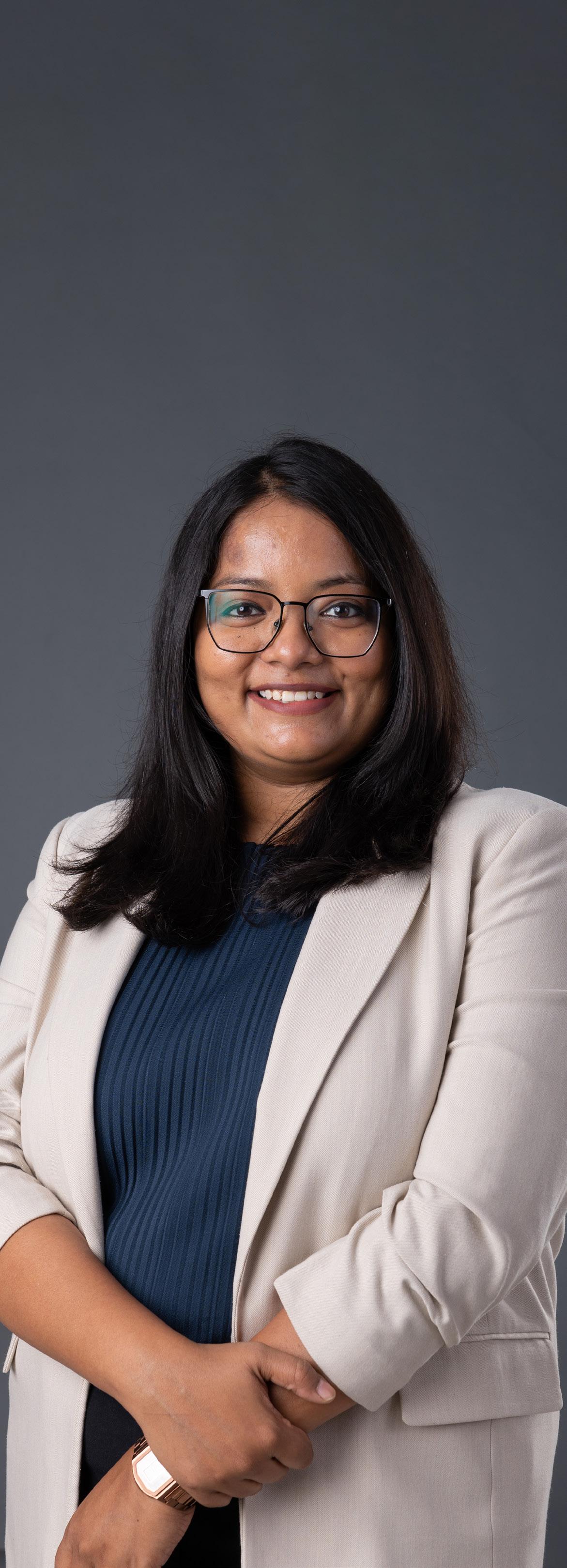

BY RANJITA BISWAS

As a biotechnology engineering student, Monica Yadav noticed many graduates struggling to apply theory in practice. This motivated her to conduct workshops for school students, where they explored science through hands-on activities and model-making to connect theory to practice and develop critical thinking early in their academic careers. Their interest inspired her to create Respire Experiential Learning (REL), a start-up that provides comprehensive STEM (science, technology, engineering and math) education programs for students through hands-on learning tools.
“Over the past nine years, I’ve developed STEM and robotics kits and established affordable tinkering labs in both urban and rural schools,” says Yadav. “Moreover, as a strong advocate for women in engineering, I lead the initiative Girls Do Science to inspire young girls to pursue STEM fields.”
With over 900 innovation labs in 11 states across India, the Ahmedabad-based start-up has reached more than 800,000 students.
Yadav is an alumna of the International Visitor Leadership Program (IVLP), the U.S. State Department’s premier professional exchange program that connects professionals with their counterparts in the United States through short-term visits. She participated in the “Hidden No More—Women in STEM” 2023 cohort. Inspired by the movie “Hidden Figures,” this IVLP examines women’s contributions to STEM through research and development, education and teaching, leadership and public policy formation.
Excerpts from an interview with Yadav.
Why is it important to introduce comprehensive STEM education solutions early in school?
Introducing STEM education early in school is vital because it cultivates lifelong learning habits and essential skills like decision-making, logic and discipline. During my initial workshops, I noticed how students thrive when given opportunities to explore and create, underscoring the importance of hands-on learning.
The impact on students was profound when we transformed traditional science labs into dynamic STEM labs, complete with interactive do-it-yourself kits and trained teachers. One memorable transformation occurred at a remote village school in a mining area. Here, girls who previously had limited educational resources were learning about renewable energy, robotics and Sustainable Development Goals (SDGs) at our STEM labs. Witnessing their excitement as they engaged with solar panel kits and built simple robots is an unforgettable experience.
In what way have you introduced these tools to the communities?
We’ve brought our STEM labs to communities through over 150 interactive experiences in fields like physics, chemistry, biology, robotics and coding. We aim to foster logical thinking and the practical application of concepts among students.
Our labs are mobile, durable and designed for easy set-up across various age groups to ensure inclusivity. We incorporate themes like SDGs, nutrition and climate change through interactive board games and activities. We also work with government and industry leaders to reach a wider audience.
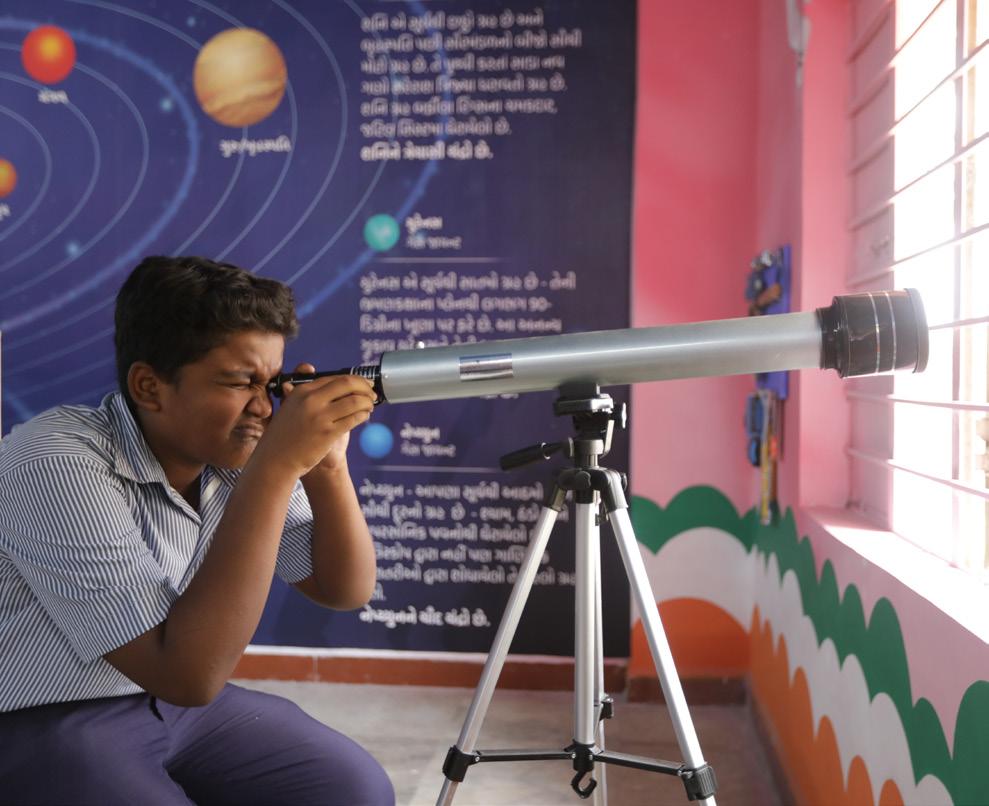
Can you tell us more about these tools? How are they designed?
Our STEM tools address the specific learning needs of schools and communities. We start with a baseline survey to understand learning requirements, which helps us tailor our tools and resources. We also provide the content in local languages.
Please tell us about your experiences during the IVLP. How did the participation help you as a STEM educator?
Women in STEM often face challenges related to confidence and isolation. The IVLP addressed these issues by connecting women with similar passions and challenges, fostering a sense of community and support. The program also reinforced the need for better access and equal participation of women in the workforce.
Participating in the program was an enriching experience—it helped me network and share my experiences with 39 other women from varied STEM fields from across the world, which was incredibly inspiring.
Witnessing the U.S. government’s strong policies and workspaces aimed at promoting more women in STEM was an eye-opening experience. It shifted my approach to designing our REL programs with a focus on inclusivity and accessibility. Our tools also include a fair representation of women scientists, researchers, engineers and homemakers, ensuring that girls see themselves in these roles.

USAID and SEWA Bharat collaborate to empower women entrepreneurs across India, fostering economic resilience.
BY PAROMITA PAIN
Gender equality and women’s empowerment have long been a part of the United States Agency for International Development’s (USAID) programs and partnerships, which are rooted in deliberate action necessary to ensure opportunity and benefits for all. One such example is its partnership with SEWA Bharat, an all-India federation of the Self Employed Women’s Association, which has been crucial in helping women join the formal workforce, and get the necessary mentorship and support to become part of India’s thriving economy.
The program is aimed at advancing women-owned social enterprises, and increasing their access to finance, markets and digital literacy.
In 2020, SEWA Bharat and USAID teamed up to launch the Udyami: Building Resilient Women Entrepreneurs program, which enabled women microentrepreneurs and women-led collective social enterprises to thrive through the pandemic and in a post-COVID economy.
“USAID’s work with SEWA Bharat started during a really trying time,” says Dr. Sharmila Neogi, adviser on adolescent health and gender with USAID/India’s health office. “The COVID-19 pandemic

and related lockdowns in India adversely and disproportionately impacted women-owned small businesses and microenterprises.”
The program for entrepreneurs is “a large-scale project aimed at advancing the rights and capacities of women-owned nano, micro and collective social enterprises and increasing their access to finance, infrastructure, markets, assets and digital literacy, during and beyond the COVID-19 period,” explains Sonal Sharma, project coordinator at SEWA Bharat. The program, she adds, has not only supported women’s economic freedom and security but has also contributed to improved economic and health outcomes for women and their families.
The vision is to facilitate women microentrepreneurs and women’s collective social enterprises to come together, while also encouraging girls in communities to form supportive youth groups to challenge social norms including early marriage, interrupted education and cyberbullying.
Linking climate and health
USAID considers the climate impacts of all its work and identifies opportunities to adapt and transform health interventions and systems, wherever possible. “Implementing climate-resilient policies with a gendered perspective is crucial,” explains Dr. Neogi. Through initiatives like the Udyami program, women microentrepreneurs in Phulia, West Bengal, actively collaborate with local weavers to explore the circular and climate-friendly nature of their weaving processes.
USAID, in partnership with the Government of India and other partners, also facilitates access to health care services, shares Dr. Neogi. For example, USAID’s Udyami program helped Premlata from Rajasthan, who stitches garments and rolls papad, to enroll in a government-funded health insurance scheme. Additionally, digital and financial literacy training helped her start using digital payment platforms and market her stitching work. She now uses WhatsApp to showcase her craftsmanship to potential customers.
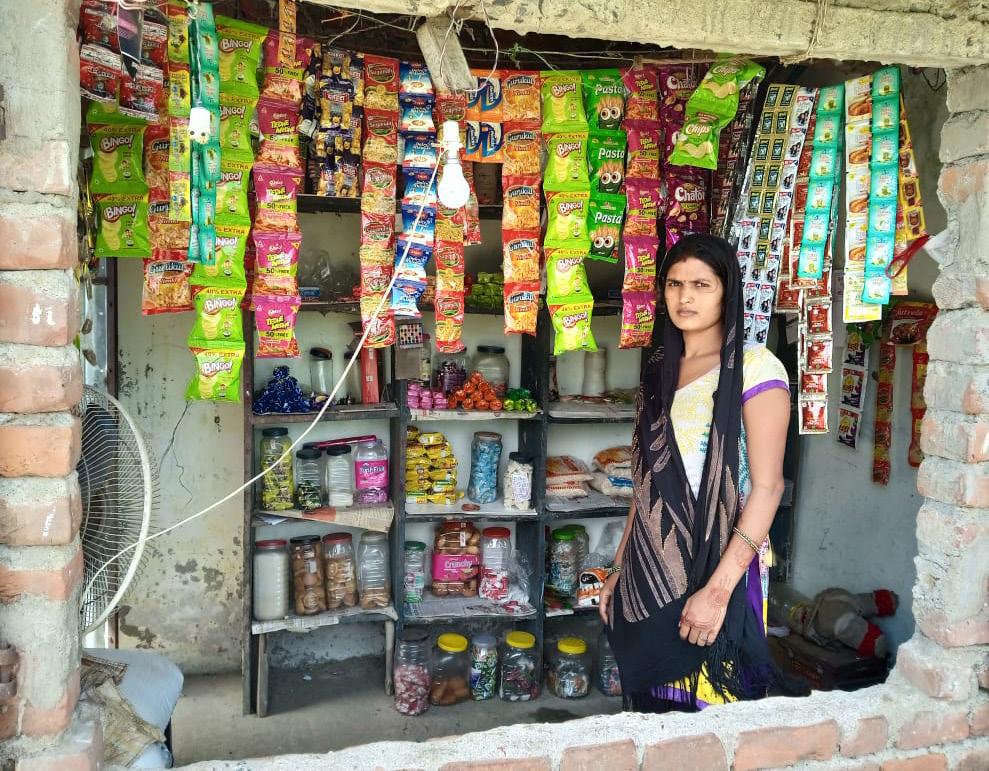
Sita Ben, a 20-year-old microentrepreneur from Dariapur village, Bihar, manages her in-laws’ store and does seasonal agricultural work. Initially describing her work simply as “working at home,” she later elaborated on her challenges after attending a SEWA Bihar meeting. She received a smartphone through the Udyami program. “When I did not have a smartphone, customers who had switched to online payments found it difficult to pay. Some people have even duped us by saying they don’t have cash and would end up not paying at all,” she says. “Now, through WhatsApp groups, I receive information on relevant schemes for microentrepreneurs like myself,” she adds, highlighting its usefulness in accessing government schemes and improving her business operations.
During COVID-19, SEWA Ruaab, a handicraft and handmade brand run and owned by women artisans, trained artisans in mask-making, which not only increased their revenue but also enhanced their visibility.
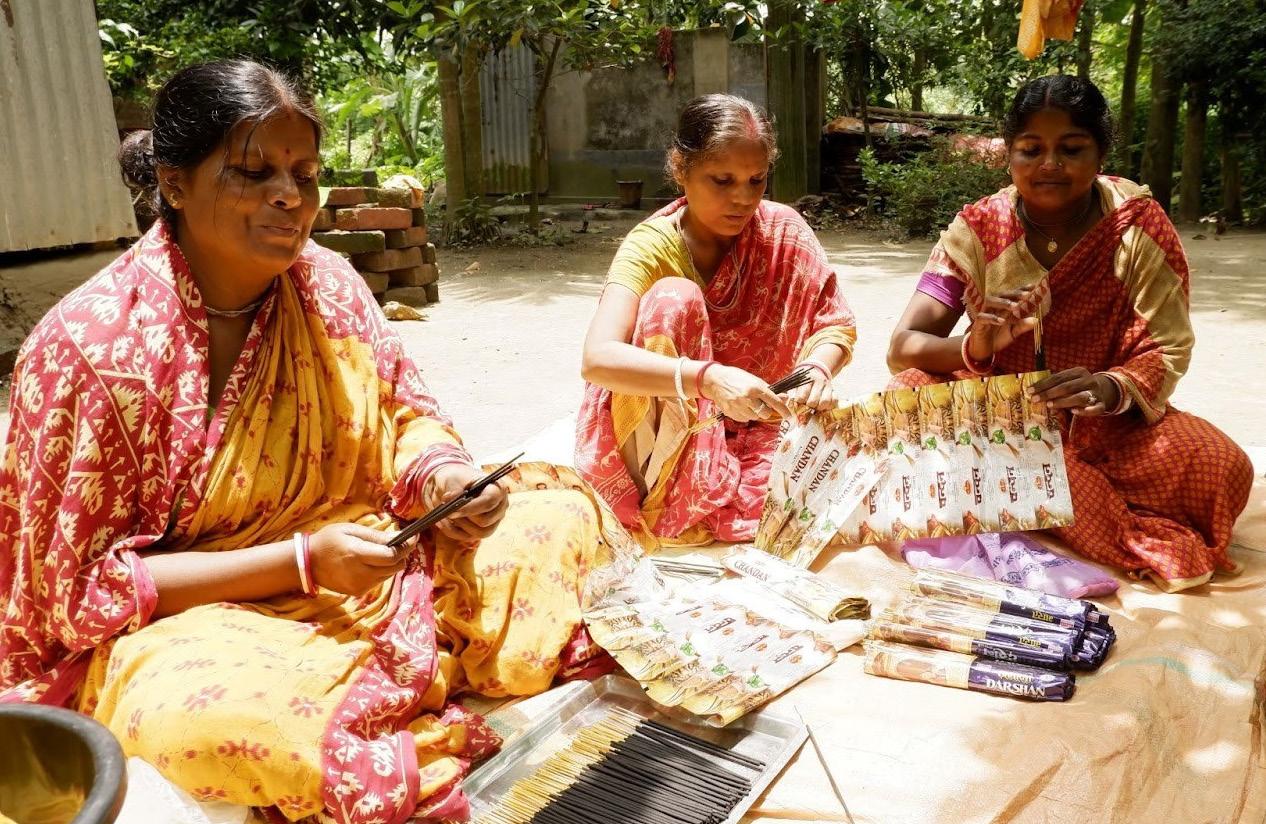
After receiving a phone through the Udyami program, I receive information about relevant schemes.
USAID’s ongoing support helps to expand their skills and product range, securing orders from domestic pret brands like Suta and Fabindia. The annual income for artisans rose by 40 percent in 2022-23. SEWA Ruaab’s participation in local exhibitions and corporate events has boosted their sales, contributing to post-pandemic recovery efforts.
Sahrin Ben, a 24-year-old microentrepreneur from Rampura, Bikaner, discovered her passion for fashion design during the pandemic. With support from SEWA Rajasthan and other programs, she bought a sewing machine to scale up her business. Leveraging social media, she now earns up to Rs. 10,000 monthly and supports her family. USAID’s Udyami program further empowered her by providing documentation assistance and health management training.
The Udyami program also runs women-friendly need-based centers, known as SEWA Shakti Kendras. These centers raise awareness, facilitate access and establish connections to government-run social security schemes related to childcare, health care, housing, water and sanitation, fuel and food.
Although primarily aimed at women, these centers extend their services to the broader community, with the goal of including entire families in existing social security schemes. This strategic approach seeks to gradually alleviate the care work burden on women. “These centers also serve as feminist spaces in the community,” says Sharma, “enhancing the visibility of women’s work and providing them with a dedicated workspace.”
Building on its work, earlier this year, USAID launched the Women’s Health and Livelihood Alliance in India, a multistakeholder initiative designed to empower women in underserved communities across the country by addressing the intersecting aspects of their health and economic well-being.
The program will provide career development and job opportunities for women, and expand their access to sexual and reproductive health care—services that promote gender equity and economic security for women.
Paromita Pain is an assistant professor of Global Media Studies at the University of Nevada, Reno.

A USAID-supported networking and mentorship program is helping women entrepreneurs find allies, support and funding for their businesses.
BY BURTON BOLLAG
Thousands of women entrepreneurs work tirelessly to create new businesses. But research shows that women entrepreneurs are more likely to face barriers, as compared to their male counterparts, and have a harder time accessing financing, market information, advanced technical skills and crucial business networks.
The United States Agency for International Development (USAID) supports tech-focused women entrepreneurs to grow their businesses, raise external funding and build networks through its WeScale program.
WeScale, a part of USAID’s South Asia Regional Digital Initiative (SARDI), offers women entrepreneurs 12 weeks of high-level training and support through online and in-person sessions. In 2023, these sessions connected 100 women from India, Bangladesh, Ne-
pal and Sri Lanka with business founders and experts. They received training and mentorship on essential business skills like marketing and branding, pitching, government policies and cybersecurity. The participants represented new businesses in a wide variety of fields, including climate and sustainability, arts and handicrafts, global supply chain, and health and wellness. USAID partners with India Accelerator, a seed stage support organization, to implement the program in India, and Accelerating Asia to operate the program regionally.
Building networks
WeScale participants say the program has helped create connections with investors, potential clients, fellow entrepreneurs and mentors.
“If you speak to any founder, they’ll tell you how lonely the journey [of entrepreneurship] is,” says Radhika Mahadevan, founder and CEO of Birdsong, a Bengaluru-based health and wellness company that produces sustainable ayurvedic oral care, skin care and pain relief products.
She says the program offered her a platform to exchange experiences with fellow small business founders, and access mentorship and support. “They really welcomed us,” shares Mahadevan. “I met with an official of one of the biggest Indian oral care companies. Normally he would have been my competitor, but there, he was my mentor.”
Deeksha Bhartiya, founder and director of Noida-based Genomiki Solutions, says the mentors helped participants learn the art of fundraising. “The mentors, typically company founders, walked us through how to talk to investors,” says Bhartiya. “We may have silly questions about business; but they were very hap -

py to help us.” She adds that many mentors stayed in touch long after the program ended.
Bhartiya, a Ph.D. in bioinformatics, says such support was especially helpful as she had no experience running a business. “A few months earlier, I was working as a scientist,” she says.
Bhartiya and Mahadevan met at WeScale and have stayed in touch. “Radhika and I come from completely different businesses,” says Bhartiya, “but we are each going through the same struggle and journey.”
Program manager Gunika Grover of India Accelerator says they wanted WeScale to reach promising women entrepreneurs who were at the early stages of developing their businesses and needed mentorship. “We wanted to keep the focus on those who could not reach venture capitalists easily, who had a new business, and who were outside of the big cities,” says Grover.
At the end of the 12-week basic program, 20 participants joined a four-week intensive program, called WeScale+, which offered additional mentorship, coaching and networking opportunities.
Through consistency, support, mentorship and partnerships, WeScale has given several women entrepreneurs the resources to grow their businesses regionally and internationally.
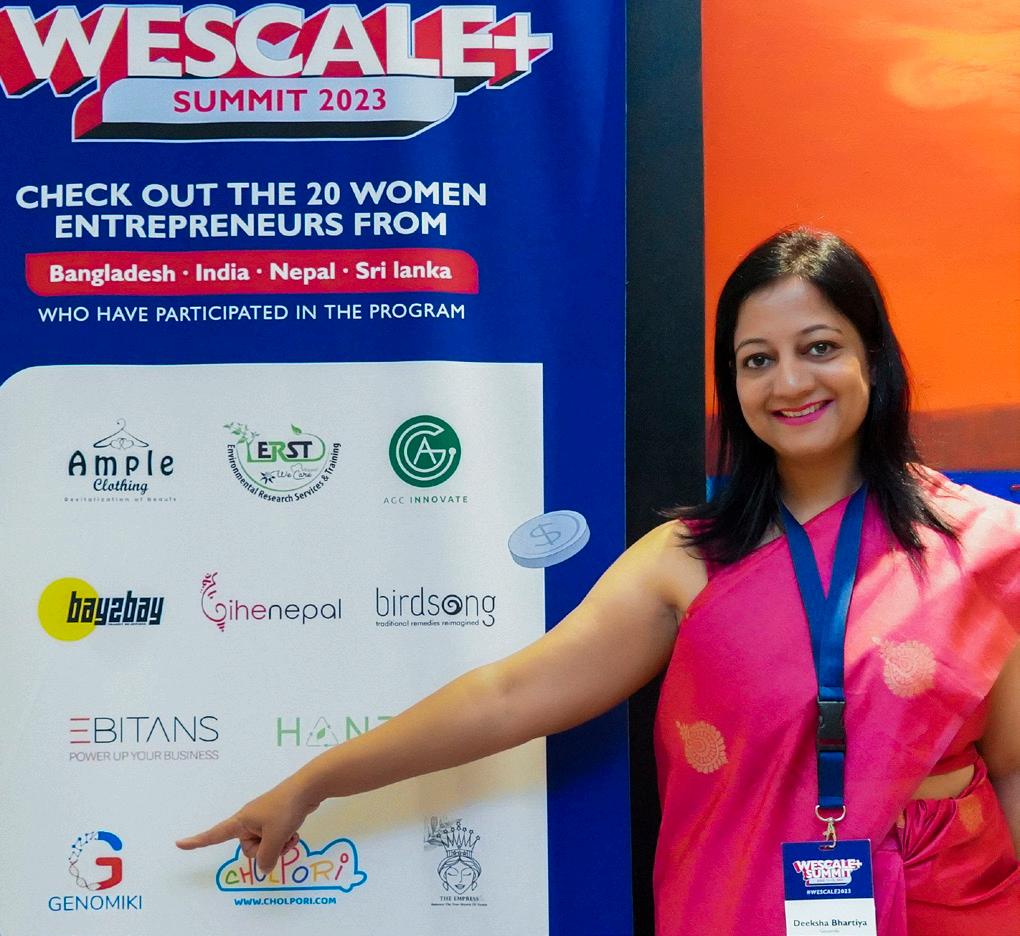
With support from Nexus and USAID, two start-ups are changing the face of menstrual hygiene management in India.
BY NATASA MILAS
The narrative around menstrual hygiene in India has seen significant changes with the increased participation of social enterprises and start-ups in making safe period products more accessible.
Two such companies, Tendryl Products and PadCare Labs, have contributed to improving women’s menstrual hygiene across India, with support from the American Center New Delhi’s Nexus Startup Hub and the U.S. Agency for International Development (USAID).
Tendryl Products, a Maharashtra-based start-up and a Nexus alumnus, manufactures sanitary napkin vending and disposal machines and has set up 2,500 machines in 65 cities across India. PadCare Labs, a USAID-funded Yash Entrepreneurs Program alumnus, has created a sanitary pad recycling machine that is part of its larger ecosystem to reduce the volume of sanitary waste. PadCare Labs recently raised Rs. 1 crore in investment through Shark Tank India.

Tendryl Products provides user-friendly napkin vending and disposal machines, a venture Arti Sharma co-founded to enhance menstrual hygiene in India. Sharma says she was inspired by social entrepreneur Arunachalam Muruganantham, who invented a lowcost pad-making machine. She says Tendryl Products’ napkin vending and disposal machines are user-friendly and operationally efficient. Users can access napkins through a variety of payment methods, including traditional cash transactions, tokens, free vending buttons, keypads, prepaid smartcards and QR codes. “Our machines come in both wall-mounted electrical and non-electrical variants to cater to a diverse array of needs and preferences,” explains Sharma.
The machines are placed in educational institutions, corporate offices and public washrooms to ensure greater access. “We provide comprehensive support, including a regular monthly supply of cost-effective sanitary pads,” says Sharma.
She notes that these vending machines have played a crucial role in improving menstrual hygiene. “Our machines provide easy access to high-quality sanitary napkins, leading to a significant reduction in unhygienic practices and the associated risk of infections,” Sharma says. In this way, “girls in schools and colleges are now more likely to attend classes regularly. In corporate offices and factories, these machines encourage greater workforce participation among female employees,” she adds.
Support from the Nexus Startup Hub introduced Sharma to an entirely new perspective on her business. “My experience with the Nexus Startup Hub was
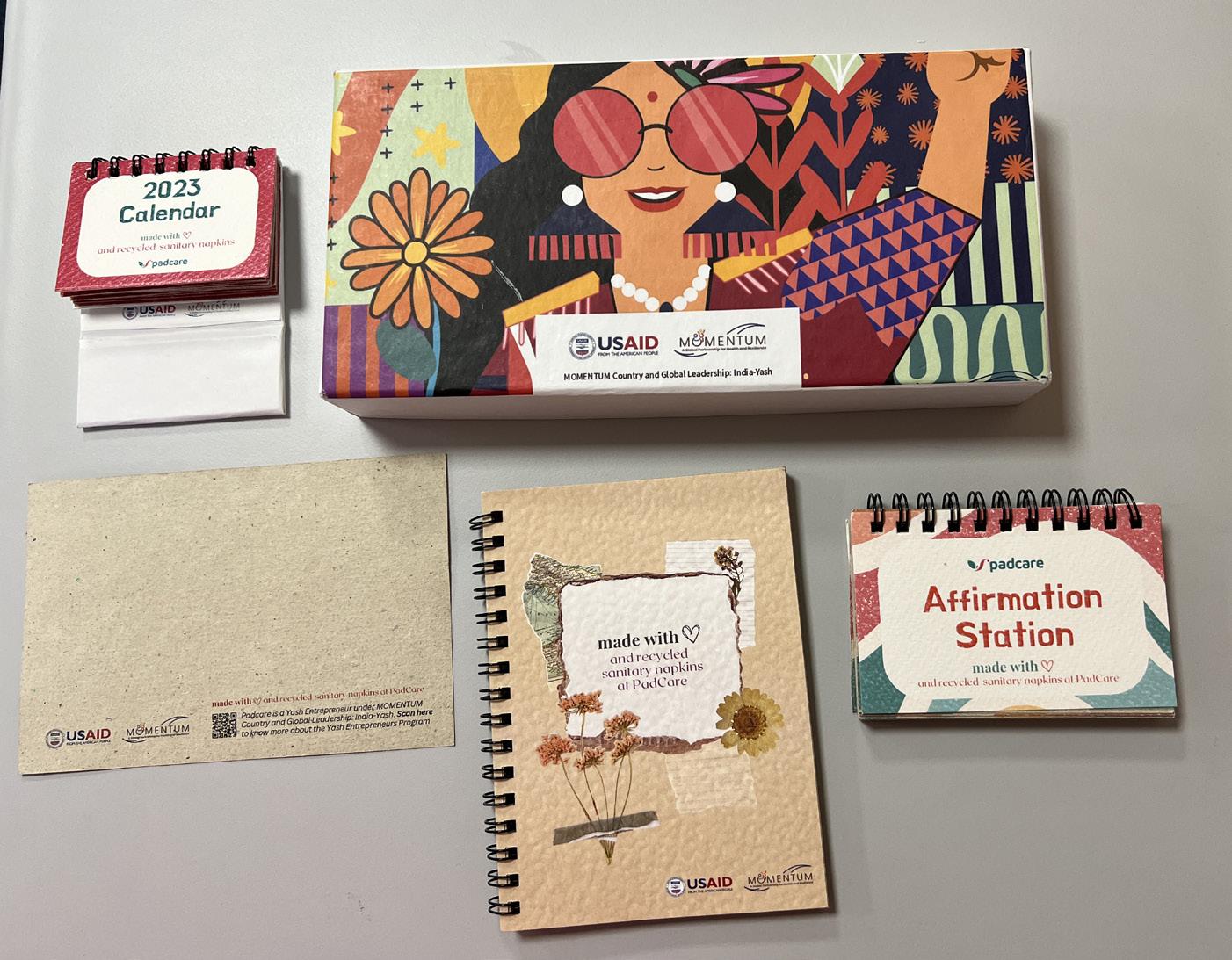
nothing short of transformative,” Sharma says. “Prior to this, I had been deeply immersed in day-to-day operations, leaving me with limited opportunities to take a step back and see the bigger picture,” she explains. “The personalized mentorship I received was a game-changer, providing invaluable guidance and insights that I had never accessed before. What stood out was the feedback; it wasn’t just about addressing weaknesses but also identifying areas of improvement in our strengths, emphasizing that there’s always room for growth.”
PadCare Labs’ menstrual hygiene management system covers the entire cycle, from providing access to sanitary pads to recycling and producing recyclable materials from used pads. An alumnus of the Yash Entrepreneurs Program, a USAID-funded initiative, PadCare Labs has had a large-scale impact on the industry.
“Established in 2018, PadCare Labs offers sanitary bins, a recycling system and products created from recycled residue,” explains Ajinkya Dhariya, founder and chief executive officer. “This innovative approach effectively breaks down hazardous waste from sanitary napkins and repurposes the discarded pads into cellulose, which has applications in the packaging industry as well as the creation of items such as vases
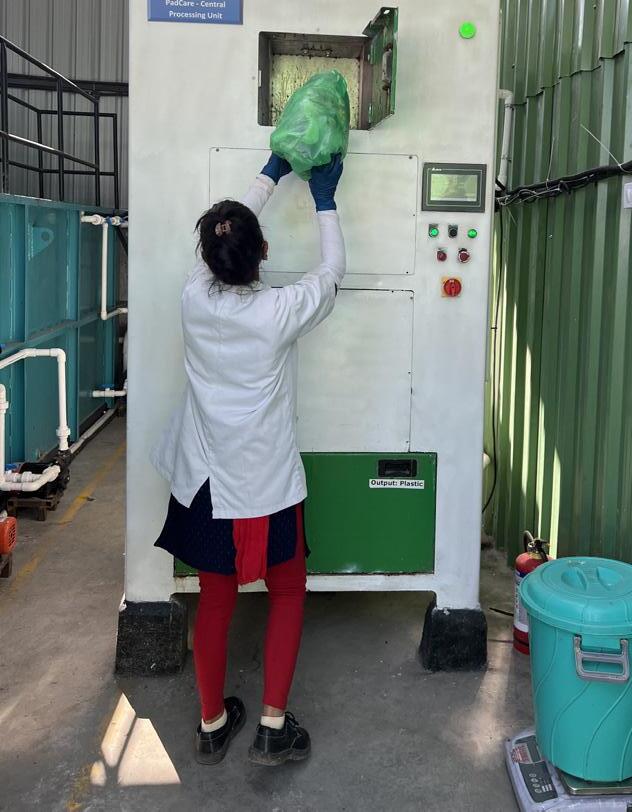
and paver blocks.”
How does it work? The start-up has developed a machine called PadCare X which is “specifically designed to disinfect and shred used sanitary napkins,” says Dhariya. The machine processes the shredded material through a solution to neutralize the superabsorbent polymer and then separates the components into recyclable cellulose. It works quite quickly, too, processing 50 pads in just 20 minutes. The benefits to the environment are profound, said Dhariya. “PadCare conserves 2.14 kg of CO2e [carbon dioxide equivalent] against per kilogram of pads.”
So far, PadCare has installed 10,000 bins free of charge across 550 clients’ offices in India, processing approximately 1.5 tons of sanitary pads daily. The company plans to introduce PadCare units in Bengaluru and New Delhi. “As PadCare continues to expand,” says Dhariya, “our goal is to offer these units using a microentrepreneurship model in second- and third-tier cities.” With these two companies working within the industry, the positive impacts on menstrual hygiene in India will continue to expand, paving the way for a more sustainable and inclusive approach to period product access and responsible disposal practices across the nation.
Meet Nexus alumna Jennifer Pandiyan, founder of a start-up that extracts potable water from the air, with zero carbon emissions.
BY ZAHOOR HUSSAIN BHAT
In 2021, Jennifer Pandiyan faced a decision between pursuing a research career or launching a venture.
Opting for the latter, she founded Thales Cleantech, a Chennai-based start-up that uses patented technology to extract potable water from the air, with zero carbon emissions.
“Only 1 percent of the water on Earth is available as potable water,” explains Pandiyan. “But the atmosphere provides over four times the entire stock of freshwater on Earth, and it is a perennial source. So, it is imperative to explore technologies that extract water from the air sustainably, and preserve groundwater.”
Thales Cleantech was part of the 19th cohort at the U.S. Embassy New Delhi’s Nexus Startup Hub and won $10,000 as a Nexus Startup Development Grant.
Pandiyan has recently been selected for the 2024 Changing Faces Women’s Leadership Seminar at the East-West Center in Honolulu. The 12-day professional training focuses on the role that innovation and entrepreneurship play in contributing to economic growth, job creation and strengthening communities. Excerpts from an interview with Pandiyan.

Tell us about Thales Cleantech’s water-from-air technology and what sets it apart.
Our technology, Atmospheric Moisture Extraction (AME), works on the concept of heat exchange and follows the precepts of nature. For example, when a car’s air conditioner blows cold air on the windows inside the vehicle and the ambient air outside is warm, you see droplets of water on the glass where the cold and hot air come into contact. This is due to heat exchange, and different methods and processes come into play.
Extracting water from the air using our proprietary technology is more cost-efficient than filtering water from available sources like groundwater through conventional processes like reverse osmosis (RO). Most RO plants depend on a groundwater source and transport it to the processing unit in tankers. They have to pay the landowner to extract groundwater, pay for the logistics, and can only package one-third of the water for further use. They incur additional costs to treat effluents, and package and distribute water. Even after filtration, water might contain pollutants like heavy metals, arsenic and fluoride. Our technology not only saves money but is also carbon-neutral and environmentally safe.
How do you ensure that the water extracted from the air is clean and safe for use?
Our machine has a two-stage air filtration system. The collected water too goes through multiple stages of filtration and is then mineralized. The water is free from contaminants as it has had no contact with the ground. The in-built sensors monitor the quality of air and water constantly in real time, which helps us ensure the safety and the quality of water. We also offer food safety certification to ensure that the machine is placed in a hygienic environment.

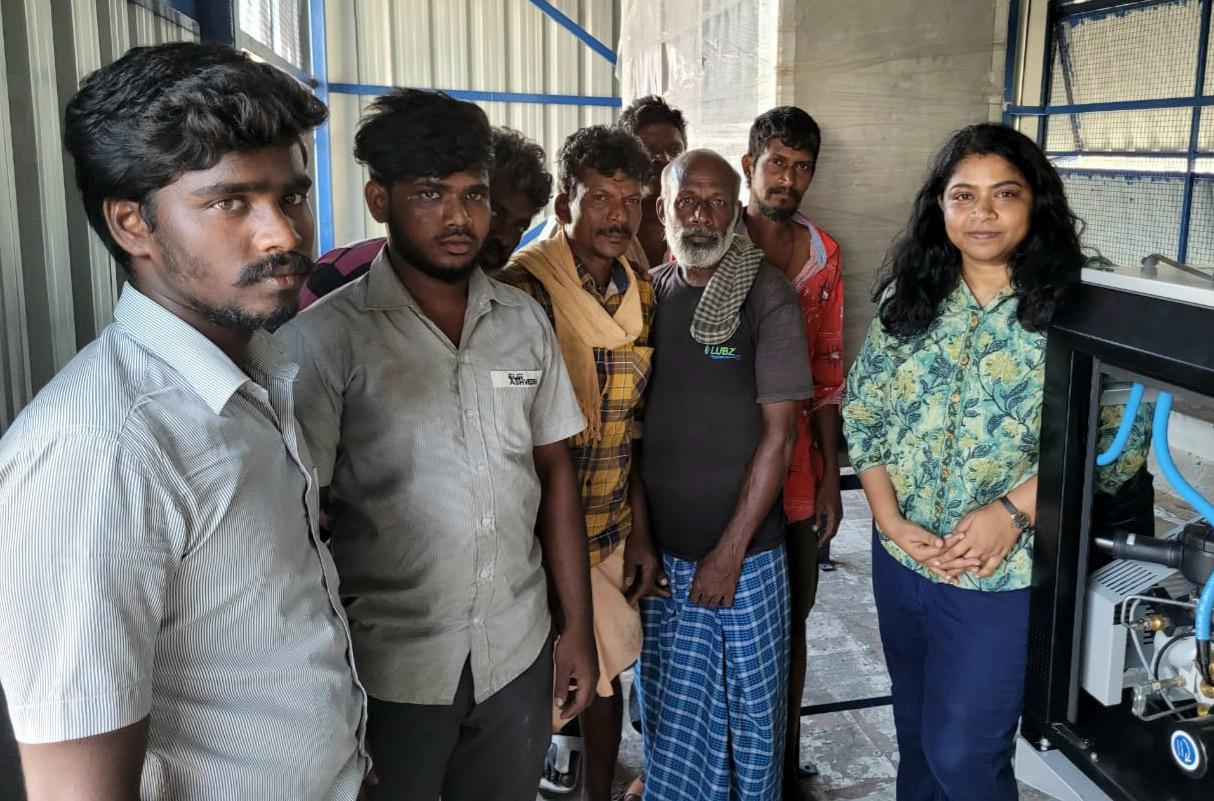
Can you share some significant milestones achieved by Thales Cleantech?
In three years, we have secured two technology patents for different processes for making water from air. We have been selected as a Technology Implementation Partner for smart cities through the India WaterPitch-Pilot-Scale Challenge by the Ministry of Housing and Urban Affairs. Under the program, we started the pilot AME plant in 2023 in Chennai, making 2,000 liters per day. This year, we are entering a scaling-up phase with 20 more installations across smart cities.
How do you foresee Thales Cleantech contributing to global water security?
We have already started researching the next generation of AME technology using ocean thermal energy, which compares the scale of desalination, with one-thousandth of its operating cost. The patent filing is in process. We plan to establish proof-of-concept and make a scale model soon. Although technology plays a crucial role, other factors like collective sensitivity, culture of consumption and policy interventions complement the process, especially in the context of global water security.
Can your technology be adapted for use in different climates and regions around the world?
This technology can work at its optimum efficiency in tropical and coastal regions where the relative humidity levels are more than 50 percent and the temperature is between 20°C and 45°C. In other parts, the efficiency and water output level will vary depending on seasonal changes.
How was your experience at the Nexus Startup Hub and what are your key takeaways from the training?
As it was my first experience of incubation, it had a significant impact on my journey. Top industry veterans taught the best business practices. Subject matter experts introduced crucial tools and provided new perspectives.
The innovative workshops, especially the mentoring sessions, were invaluable resources, creating a paradigm shift in my way of managing my company. Nexus has been a space where we are able to brainstorm ideas among fellow founders, meet investors, get mentored, and cheerlead each other, venturing into collaborations among us.
Aumsat Technologies, a Nexus-trained start-up, uses satellite data to detect pipeline leaks and find groundwater sources.
BY GIRIRAJ AGARWAL
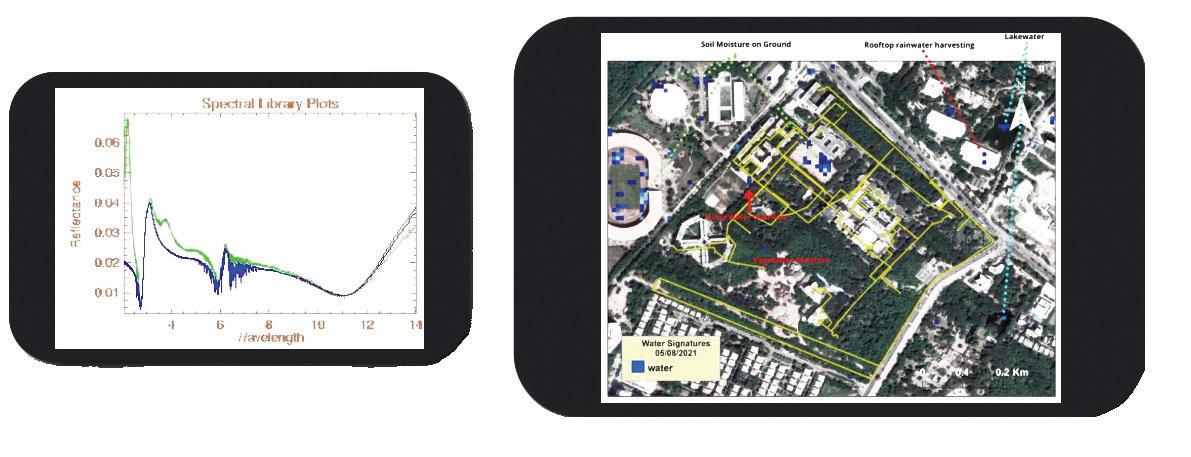
Clean water is vital for public health, communities and the economy. Water is also an essential resource for agricultural production, including irrigation, livestock and farm management and the preservation of produce. Unfortunately, leakages in water supply pipes result in the daily loss of millions of liters of water and facilitate the entry of potentially harmful contaminants into our drinking water. A Mumbai-based start-up, Aumsat Technologies, uses satellite-based data to detect and predict leakages in water pipeline networks, while also identifying potential groundwater sources.
The idea of utilizing satellite scans came to the founder, Riddhish Soni, during his tenure as a scientist on the Chandrayaan-2 lunar mission with the Indian Space Research Organisation. Soni’s primary responsibility on Chandrayaan-2 was to focus on the exploration of essential resources on the moon. This included the search for water, helium-3 radioisotopes, as well as deposits of iron and titanium—elements critical for prospective future lunar exploration and potential colonization efforts.
“While working on this mission,” he says, “I realized that if we can detect water on the moon, why not harness this technology to locate groundwater resources
Left / Aumsat has detected 2,600 leakages and digitized approximately 15,000 km of pipeline networks, helping conserve water and reducing the economic and environmental costs associated with water loss.
on Earth, especially in regions plagued by drought.”
This idea was the cornerstone of what would evolve into Aumsat. Together with his co-founder, Chetan, Soni began to harness satellite data to create systems aimed at targeting, monitoring and prospecting water resources. The start-up’s initial focus was on developing the technology for farmers, to improve irrigation efficiency and crop yield. This technology was further refined and hyperlocalized to detect leakages in pipelines. “Our focus has especially been on alleviating water scarcity in drought-stricken areas across India,” says Soni.
Aumsat was part of the 15th cohort at the Nexus Startup Hub at the American Center New Delhi. A partnership between the U.S. Embassy New Delhi and the Alliance for Commercialization and Innovation Research (ACIR), Nexus connects start-ups, innovators and investors.
Speaking about the training at Nexus, Soni says it provided a wealth of knowledge that has been instrumental in shaping Aumsat’s trajectory. Key areas included financial management for long-term viability, effective storytelling to communicate the start-up’s mission,
and body language and fundraising techniques to build confidence and credibility, particularly when pitching to potential investors and partners.
“Problem-solving sessions enhanced our ability to tackle complex challenges, while understanding intellectual property strategy was essential for protecting our innovations and maintaining a competitive edge,” says Soni. “Overall, the training equipped us with essential skills, significantly enhancing our competitive positioning in satellite technology applications.”
Aumsat uses the cutting-edge capabilities of Japan’s L Band satellite, which allows it to penetrate up to 10 meters in concrete and 60 meters in dry soil, and detect underground features with great precision.
The principal technologies employed are radar polarimetry for identifying groundwater and radar interferometry for detecting changes below the Earth’s surface. “Radar polarimetry allows us to differentiate between water and other substances, providing accurate insights into groundwater resources,” explains Soni.
“Radar interferometry allows us to detect changes over time in the environment below the surface. By comparing multiple radar images taken at different times, we can identify subtle changes indicative of pipeline leakages, ground subsidence, or other alterations in the landscape. This technology plays a crucial role in our pipeline leak detection efforts,” he adds.
Since its inception in 2019, Aumsat has scanned over 44,000 hectares of land, created 3,800 water points, and positively impacted the lives of thousands of smallholder farming families across rural India. “These farmers now have better access to water for irrigation, significantly improving their agricultural productivity and sustainability,” says Soni.
Aumsat has also detected 2,600 leakages and digitized approximately 15,000 km of pipeline networks, which has resulted in saving approximately 17,000 kiloliters of water every month. This effort not only helped conserve water but also reduced the economic and environmental costs associated with water loss.
“Our technology and services have attracted a diverse client base, including smart cities like Udaipur, Indore and Gandhinagar,” says Soni, adding that Aumsat is working in 29 districts across India. “In our recent project in Udaipur, we successfully detected 47 leaks,” he says. “This not only resulted in savings of $200,000 in revenue water but also conserved 38,000 kiloliters of

water.” Aumsat’s technology can also be instrumental in detecting carbon dioxide and trace gas emissions. This is becoming increasingly important as countries around the world strive to reduce their carbon footprints in response to global climate change. “By accurately identifying and quantifying these emissions, we can provide data that supports informed policy-making and compliance with international environmental standards,” says Soni.
The start-up has implemented a diverse range of projects that leverage its advanced satellite technology for various practical applications. These include collaborating with the Indian Army to identify underground tunnels for national security, and supporting the Indian Navy in submarine detection.
Soni’s goal is to digitize all pipeline networks throughout India, which will help augment the government’s ability to significantly upgrade the infrastructure. “By converting lost water into an economic asset, we aim to support the provision of at least 55 liters of water daily to each rural household by 2030, aligning with sustainable development goals,” he says. His company is also venturing into new technological fields, developing a meteorological rocket for cloud seeding and expanding into robotics and the Internet of Things (IoT).
“These endeavors are part of our broader mission to utilize technology for societal benefit,” says Soni, “ensuring that our advancements in satellite and radar technology directly boost the quality of life and promote environmental stewardship.”
Nexus alumnus Mihir Dixit’s start-up creates efficient and affordable garbage disposal machines that help keep nonrecyclable waste out of landfills.
BY BURTON BOLLAG
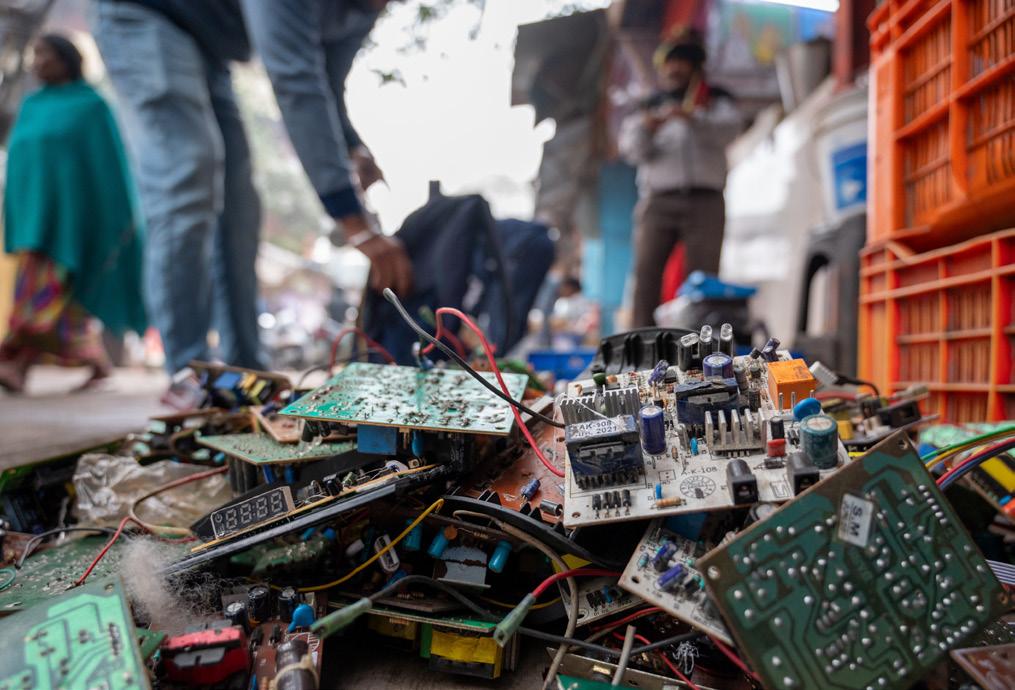

ne of the challenges facing today’s increasingly industrialized communities is what to do not only with the growing quantities of garbage but also how to dispose of toxic waste. Nexus alumnus Mihir Dixit believes he has found a solution.
Dixit and Dhruv Chauhan founded Malhari Projects in 2021. The Ahmedabad-based start-up provides an affordable waste disposal machine that works on patented technology to incinerate toxic waste on site. Chemical, pharmaceutical and electronic companies currently either send their nonrecyclable waste to landfills or incinerate the waste in kilns to produce cement. Plastic waste is usually incinerated as it burns well and reaches the high temperatures needed to make cement. While believed to be a safer way to remove plastics from landfills, critics claim that this method produces toxic byproducts that contribute to air pollution.
Malhari’s technology is promoted as a more ecological alternative to both methods. Its waste disposal machines use a technology based on infrared pyrolysis, which safely burns the waste and converts most of it into air, says Dixit, leaving little ash or metals as residue. This residue can be reused or disposed of safely.
Dixit and his team spent three years developing the patented technology used in Malhari’s waste disposal machines and launched production in January 2024. The devices are manufactured at the start-up’s workshop in Ahmedabad and cost about Rs. 25 lakh each—about one-third the price of traditional pyrolysis devices, says Dixit. Each machine can dispose of 1,000 kilograms of waste per day.
The hazardous waste, explains Dixit, is put into a
box or machine chamber and screwed shut. The waste is then burned at temperatures of 600°C to 700°C in an oxygen-free environment using infrared radiation. “Our innovation is to use lower-than-usual temperatures and to focus the radiation only on the contents of the chamber, instead of heating the whole chamber,” explains Dixit. “We dispose of the waste at a lower cost and without segregating what can be burned together.” The waste is also treated on-site, which cuts down on the cost of transporting it to a landfill or offsite incinerator. “Our machine can be installed on a company’s premises and eliminates the whole waste disposal channel,” he adds.
Nexus boot camp
Dixit graduated from Gujarat Technological University in 2017 and enrolled with the Nexus Startup Hub at the American Center New Delhi in 2022. A partnership between the U.S. Embassy New Delhi and the Alliance for Commercialization and Innovation Research, Nexus helps Indian start-ups grow and succeed. The three-month, full-time program included formal classes and lectures and connected participants with mentors from industry and academia.
An important area covered in the training was communication. “We got to know the difference between what we are saying and what people understand,” says Dixit. “They showed us the way to eliminate those gaps.” Dixit says he developed a strong working relationship with a mentor at the Nexus program, who helped him refine the start-up’s marketing approach and continues to guide him on ongoing business issues. The mentor, according to Dixit, brought a fresh perspective. “We had a customer-centric approach,” he says. “The mentor promoted a solution-centric approach. Rather than being a salesman for your project, you are a ‘painkiller’ helping a company deal with [the headache of] its waste disposal problem.”
Malhari Projects has already installed its devices onsite for a municipal waste disposal company and a chemical company, both in Gujarat. The start-up is in discussion with more potential customers. With Malhari’s technological innovations, which make waste management affordable and efficient, Dixit expects the business to grow by leaps and bounds.
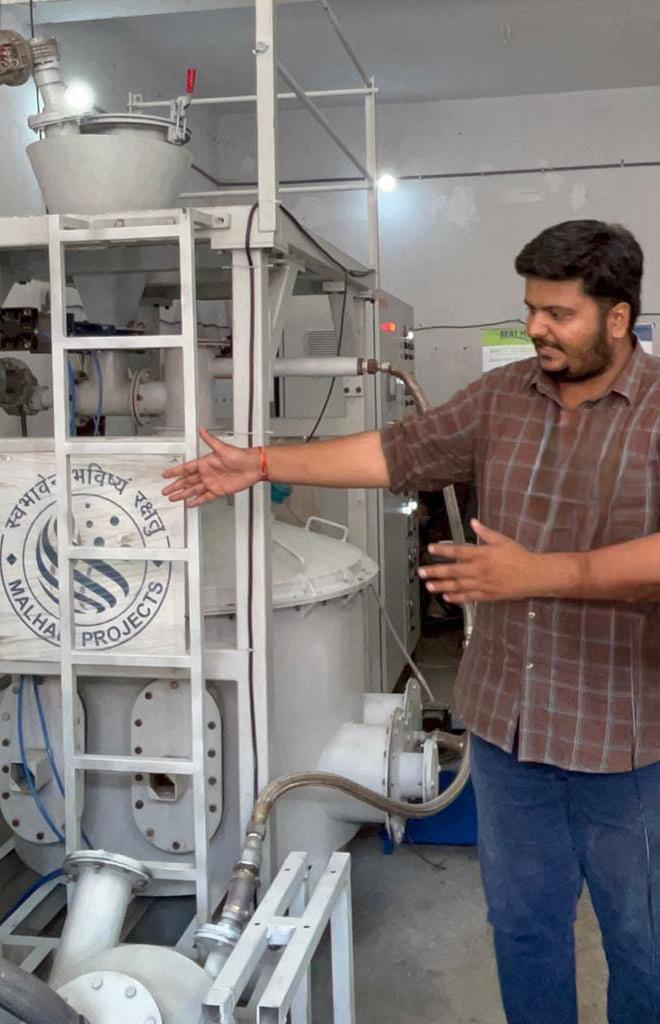
Our innovation is to use lower-than-usual temperatures and to focus the radiation only on the contents of the chamber, instead of heating the whole chamber.
A USAID-supported app gives the LGBTQIA+ community a safe space to navigate mental health and daily challenges.
BY BURTON BOLLAG
Anshul Kamath was diagnosed with a chronic autoimmune disease in 2016. He had just quit his job in London and returned to India. In the process of learning to live with his diagnosis, Kamath realized that mental health issues also require routine care, just like physical health. A year later, he started networking with psychologists, life coaches and wellness professionals to facilitate workshops on emotional well-being. This is how Evolve—a digital platform to help users find mental health support—was born.
Initially launched as a mental health app for everyone, Kamath and co-founder Rohan Arora pivoted to focus on the LGBTQIA+ community in 2021 after noticing signs of traction. At their Mumbai-based startup, Kamath and Arora lead a diverse team representing various gender identities and sexual orientations.

This inclusive environment has helped Evolve become a safe space for the LGBTQIA+ community, offering tailored support and resources.
Research shows that members of the LGBTQIA+ community are significantly more likely to face serious mental health challenges compared to others. “Individuals who are part of the community experience minority stress,” explains Kamath. This term refers to elevated levels of stress that members of stigmatized minority groups often face. Sources of minority stress can include rejection, homophobia and bullying.
“The stigma present in many communities surrounding mental health often prevents individuals from seeking help, exacerbating their conditions. The U.S. Agency for International Development (USAID) has found that integrating mental health services into existing health programs can normalize mental health care, reduce stigma, and encourage more people to seek the help they need,” says Moni Sagar, family health division chief, USAID/India.
Evolve, with USAID’s support, offers a space that addresses the mental health impact of these minority stress factors. “Acknowledging the scarcity of queer affirmative therapists and digital mental health platforms, Evolve has pioneered a 3C approach—content, community and coaching—to create better mental health outcomes for the LGBTQIA+ community,” explains Kamath. “Through partnerships across the country, we are strengthening early screening and diagnosis, improving treatment adherence, and reducing patient drop-out rates,” adds Sagar.

The platform, Kamath says, has democratized content, making it both created by and tailored for the community of users. Over 100 guided introspective therapies have been created with experts, queer therapists and Evolve users. The app includes queer-specific features that are integrated into its UI/UX (user interface/user experience), helping users be their authentic selves. “This includes being able to choose your own pride flags and affirmation backgrounds that can be personalized to celebrate your unique identity,” says Kamath. “Evolve app users benefit from an environment free from judgment or stigma, where they can explore challenges and triumphs at their own pace. In-app communities focus on lived and shared experiences to foster a sense of belonging and reduce feelings of isolation and invisibility,” adds Sagar.
To enhance authenticity, Evolve collaborates with “super users,” customers who use the product regularly and spend more on it than others through in-app purchases. “One of Evolve’s super users was Carmen Neely, the co-founder and CEO of Harlem Pride—one of the largest nongovernmental organizations for and by the LGBTQIA+ community in the United States,”
says Kamath.
The last “C” is coaching, where users can connect with mentors, life coaches and therapists to discuss long-term goals and challenges and find personalized solutions that work for them. This can include one-onone or group sessions with trained providers for better mental health outcomes.
So far, the Evolve app has been downloaded over 1 million times and has a user rating of 4.7 on Google Play. Evolve was featured in 2023 by Google as one of the top four apps globally for mental health. As part of its commitment to driving societal change and promoting inclusivity, Evolve plans to partner with researchers and organizations focused on advancing LGBTQIA+ rights. “We also have plans to make the app more accessible and localized by translating the app into multiple Indian languages,” says Kamath, “so users across India can find support and comfort, especially where accessibility is a challenge.”

A Nexus-trained start-up uses artificial intelligence and robotics to make medical treatment more precise and efficient.
BY JASON CHIANG
Recognizing the need to enhance precision and efficiency in patient treatment, Sravan Kumar Maddela and Pavan Manthravadhi co-founded Scichip Robotics in 2022.
The Hyderabad-based start-up’s flagship product is an artificial intelligence (AI)-powered autonomous surgical robotic system. It is designed to help laparoscopic and endoscopic surgeons manage surgical camera movements during procedures. It uses AI algorithms to improve the precision and effectiveness of surgical tasks, reduce procedure times, and minimize the risk of human error.
Scichip was part of the 18th cohort at the Nexus Startup Hub, a partnership between the U.S. Embassy New Delhi and the Alliance for Commercialization and Innovation Research (ACIR). Nexus connects start-ups, innovators and investors, offering access to networks, training, mentors and funding. Excerpts from an interview with Maddela.
Our aim is to allow laparoscopic surgeons to control cameras autonomously, thereby enhancing precision and decision-making capabilities.

Why did you decide to target laparoscopic surgery?
My co-founder, Pavan, and I have extensive experience in the field of medical devices. Our research and work experience helped us understand the challenges surgeons face during operations. The decision to target laparoscopic surgery was also influenced by the widespread use of this technique. Better support for such surgeries can significantly benefit surgeons, assistants, hospitals and patients. Our aim is to allow laparoscopic surgeons to control cameras autonomously, thereby enhancing precision and decision-making capabilities during surgeries.
How did you become interested in the intersection of technology and health care? What would be your advice for people who are interested in these fields?
I am from a village in the Tirupati district of Andhra Pradesh. As a child, I wanted to become a doctor, but it wasn’t possible due to my family’s financial situation. Despite this, I earned a master’s degree in electronics and redirected my career toward biomedical engineering to stay connected to the medical field. Currently, I am pursuing a Ph.D. in AI and medical devices, and I have worked with both start-ups and major corporations.
tion of AI-powered robotic systems that can analyze vast amounts of data in real-time, assist surgeons in complex procedures, and improve patient outcomes through minimally invasive techniques. The increased accuracy offered by AI-driven surgical robots has made surgeries safer and faster.
However, despite advancements, the high cost of AI-based surgical systems limits their accessibility, particularly in low-resource settings. Making these technologies more affordable and widely available remains a significant challenge.
Additionally, the regulatory landscape for AI in health care is still evolving. Ensuring compliance with regulations while maintaining ethical standards, particularly concerning patient data privacy and consent, is crucial for widespread adoption.
What were your main takeaways from the Nexus program? How did these experiences shape your journey as an entrepreneur in tech and health care?

Early on, I noticed the need for affordable, advanced medical technologies globally. By using AI and robotics, I aim to create solutions that make medical treatments more accurate, streamlined and accessible to more people, ultimately improving patient care.
To succeed in the health care field, it is crucial to stay patient-focused. Building a diverse team by collaborating with professionals from various backgrounds enhances innovation and effectiveness. Additionally, understanding and complying with health care standards and regulations is vital for maintaining quality and safety.
As an entrepreneur in AI, what is the most promising change you’ve seen in this field as it gains more mainstream adoption?
The most promising change I’ve seen is the integra-
The Nexus program significantly enhanced our understanding of entrepreneurship. The insights gained from one-on-one mentoring helped refine my strategic vision, enabling me to align Scichip’s technological innovations with real-world health care needs effectively. The connections made with potential collaborators and investors have facilitated partnerships that are crucial for advancing our projects and securing funding. The workshops on pitching and business strategy honed my ability to convincingly communicate our value proposition, attracting interest and support from stakeholders.
Focusing on customer-centric solutions during the training reinforced the need to prioritize end-user experiences in our development efforts, ensuring our technologies address real user issues and make a difference in health care.
Nexus-trained Charzer is accelerating the electric vehicle transition in India by increasing access to charging stations.
BY HILLARY HOPPOCK
After immersing himself for five years in electric vehicle (EV) start-ups for Amazon e-commerce and delivery companies, Sameer Ranjan Jaiswal envisioned a transformative future for EV charging stations in India. Reflecting on a friend’s experience in 2019, who had to travel 18 kilometers and wait four hours to charge an EV scooter, he says, “I remember thinking, ‘What if EV chargers were readily available in workplaces, cafés and local kirana stores?’ ” says Jaiswal. Aiming to “accelerate the EV transition in India,” Jaiswal launched Charzer in Bengaluru.

An EV charging station aggregation platform, Charzer is building an ecosystem with a fleet of electric scooters and a network of charging stations. EV owners can access its services by downloading the mobile app, locating the nearest Charzer station, checking prices, reserving a slot and making payments—all within the app.
The start-up was part of the 13th cohort of the Nexus Startup Hub, a partnership between the U.S. Embassy New Delhi and the Alliance for Commercialization and Innovation Research (ACIR).
Nexus connects start-ups, innovators and investors, offering access to networks, training, mentors and funding.
Working with equipment partners Tata Motors and Volvo, Charzer has developed a range of commercial and residential charging stations tailored for installation in cities, towns, villages, apartment complexes and delivery companies. Charzer’s flagship product, Kirana Charzer, is a compact and web-enabled charging station. It can be installed at neighborhood cafeterias, restaurants and malls—essentially anywhere with an electricity connection, without the need for any infrastructural changes. It is compatible with all EV vehicles and installed by certified professionals. Small business owners can install a charging station for Rs. 10,000 and share revenue with the company.
Since its launch in 2020, Charzer has established a robust charging station network, with over 50,000 users in 250 locations across 20 states. It powers over 1,000 electric cars every day and provides 500 kWh of electricity every month.
To expand its reach, Charzer has partnered with cab companies, and more than 20 fleet partners utilize Charzer’s unique integrated charging devices for tracking and monitoring data, according to Jaiswal. This gives fleet managers insight into both fast full charging and safe driving.
Charzer’s business model provides end-to-end EV charging management and ease of use for customers. This includes installing the charging station, connecting it to a power source, and providing the software that monitors and tracks usage, access and payment collection. In residential complexes, Charzer’s software allows users to track the usage per resident or per apartment on a real-time basis. It sets up electricity pricing for automatic billing, payment collection and report generation. Each charging station is rigorously tested for safety and reliability with protection against overvoltage, overcurrent, surge and short-circuits. The software access control regulates who is allowed to charge their vehicle to prevent unauthorized usage.
As Charzer grows, the company has seen an increase in usage, with energy consumption rising from 500 units in 2020 to 500,000 units in 2024.
For apartments, offices and fleets, Charzer offers a unique load-balancing solution that results in charging
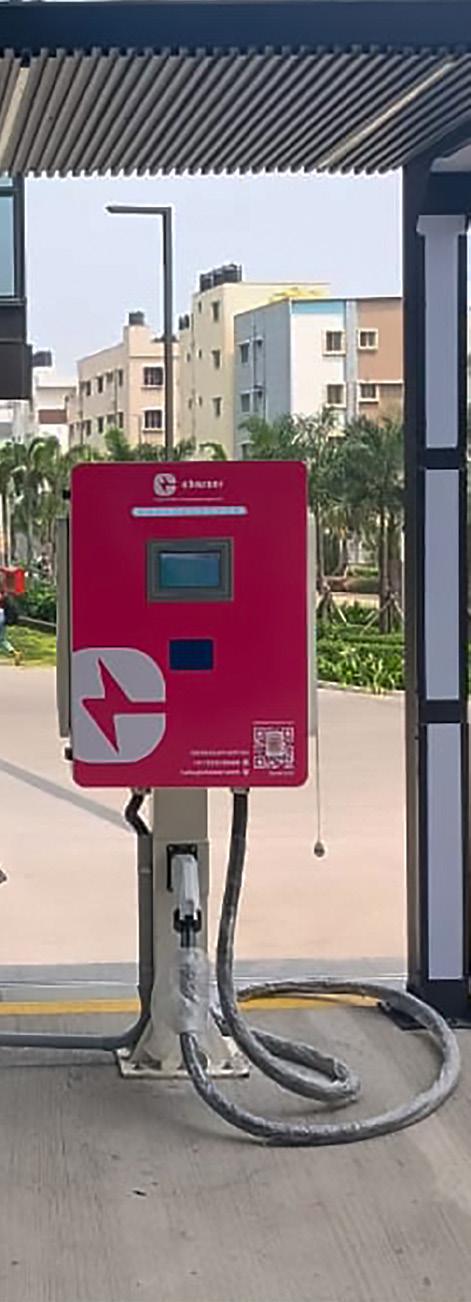
more vehicles with limited electricity. This approach has allowed Charzer to maximize energy efficiency, resulting in a 75 percent reduction in load costs and monthly expenses. Additionally, users of the charging space can also load balance with lifts, motors and other existing load-bearing equipment.
Jaiswal attributes the first year-and-a-half of Charzer’s growth to the training at the Nexus Startup Hub. “It was transformational. We discussed week-byweek targets and learned how to narrow our focus on a small set of customers who came to view us as their first option,” he says. “As a result, we became strong in the market, and we were able to expand our base.” Jaiswal notes that Charzer continues to rely on Nexus to expand connections, seek advice during challenges and explore market opportunities.

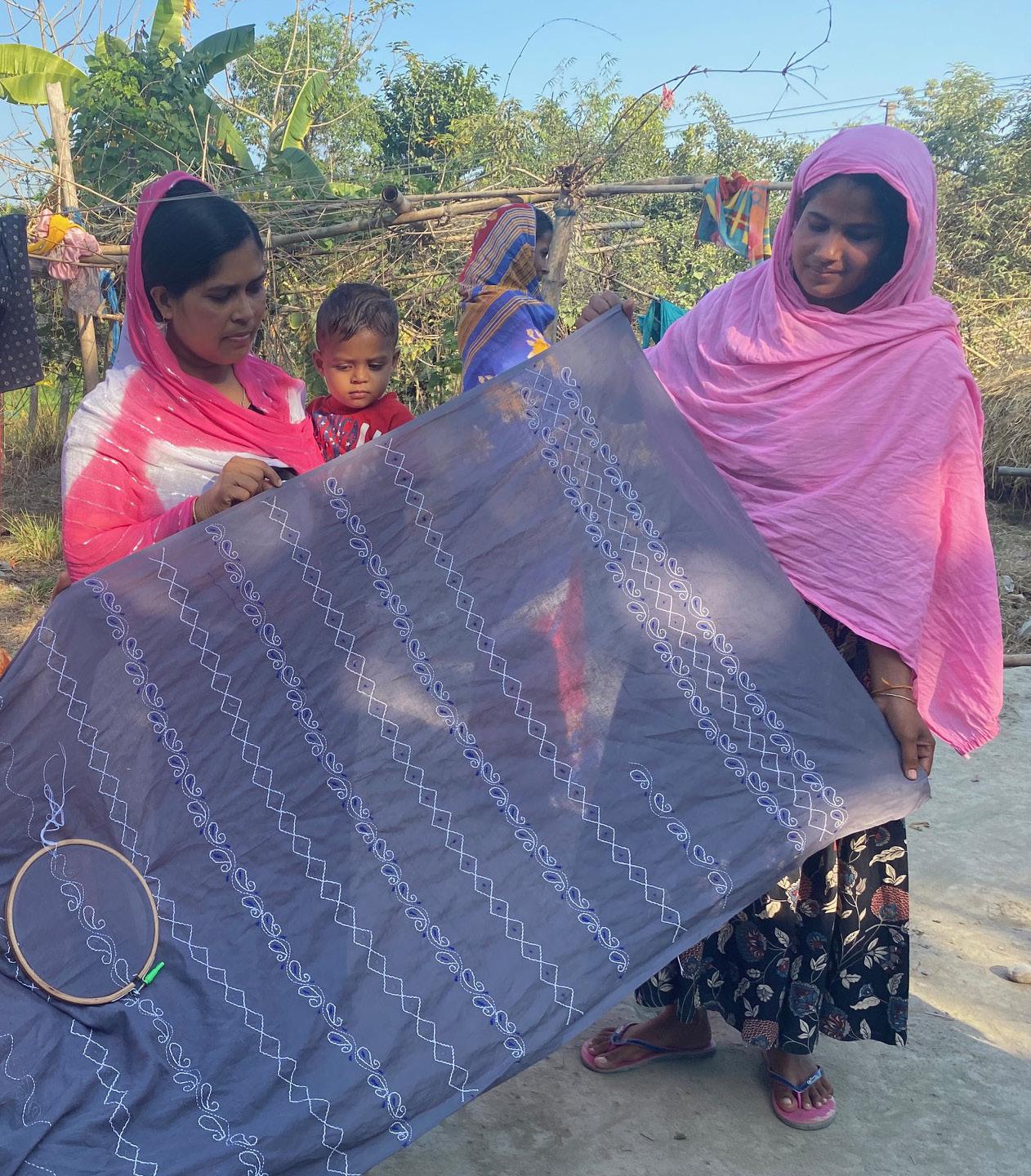

Manjuwara Mullah helps women from riverine communities in Assam craft economic independence, with support from a U.S. Consulate General Kolkata initiative.
BY RANJITA BISWAS
Amrapari is a women’s collective in Assam’s Barpeta district that creates sustainable livelihoods for women daily wage earners. Situated on the north bank of the Brahmaputra, the district is dotted with numerous riverine sandbanks, known locally as char-chapori People in these areas typically rely on agriculture and manual labor for their livelihoods and are frequently displaced by annual floods.
Manjuwara Mullah, a women’s rights activist based in Barpeta and founder of Amrapari (meaning “we can”), helps women from these areas earn a livelihood from traditional handicrafts. Mullah is an alumna of the U.S. Consulate General Kolkata-sponsored Women Wielding the Workplace initiative, which provides capacity-building, mentorship and knowledge-sharing. The program aims to create supportive networks that
encourage more women to participate in the workforce. Mullah says the program truly helped her scale up the enterprise. “Earlier, I didn’t have any idea about a business enterprise and how to promote the work of Amrapari,” she shares. “The knowledge I gathered during these sessions gave me perspective and confidence to implement changes and innovate.”
The story of Amrapari goes back to 2020 when many women from riverine communities lost their sources of income during the COVID-19 lockdown. While supplying relief material to families in the area as a volunteer, Mullah found that the women of the char-chapori area had been struggling to make ends meet. “Incidents of domestic violence were increasing too,” she remembers. “Many men had lost their jobs and women bore the brunt.”
Mullah, who also grew up in a riverine community, recognized the skill of the local women in embroidery and quilt-making. She encouraged them to utilize these talents by starting to create embroidered quilts for commercial markets. Employing a traditional craft, known as kantha in West Bengal, the women stitched together fabric pieces to make the quilts. Mullah provided the fabrics and the yarn, shared photos of the finished products on social media and found many interested buyers. Thus, Amrapari was established as a cooperative society.
Today, Amrapari provides employment to over a hundred women, who earn between Rs. 3,000 to 4,000 per month. Mullah emphasizes that this economic independence has empowered the women, enabling them to have a voice in their households.
Over the years, Amrapari has diversified its product line. “We now make embroidered handbags, sarees, diaries, folders, pillowcases and cushion covers,” shares Mullah. “Recently, we also invested in looms to weave mekhela sador—the traditional Assamese two-piece ensemble.”
From her upbringing in a village within the charchapori area, Mullah has traversed a remarkable journey to become a social entrepreneur. She credits much of her success to the unwavering support of her family, particularly her father, who prioritized her college education. “Education is the key to open many doors,” she says.
The knowledge gathered during the Women Wielding the Workplace program gave Manjuwara Mullah confidence to implement changes in her enterprise and innovate.
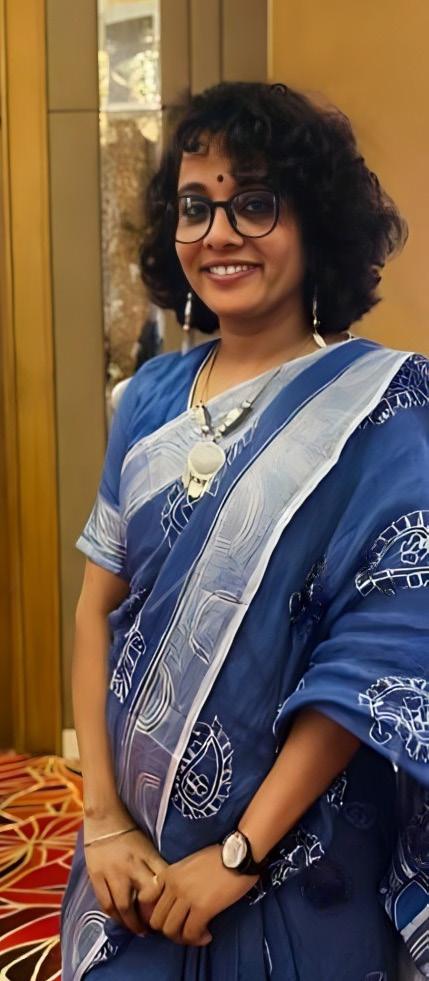
The USDA’s Cochran Fellowship Program empowers women agribusiness entrepreneurs and strengthens local economies.
BY JASON CHIANG
The Cochran Fellowship Program, named after the late U.S. Senator William Thad Cochran, offers shortterm training in the United States for agricultural professionals from around the world. The fellowship aims to enable the participants to contribute to the agriculture systems in their home countries and strengthen trade ties with the United States. The Cochran Fellowship Program is part of the United States Department of Agriculture’s (USDA) Foreign Agricultural Service.
In July 2024, a cohort of Indian women entrepreneurs in agribusiness participated in the program through a partnership between the U.S. Consulate General Mumbai and the USDA. The fellows received training in food processing and packaging. They par-
ticipated in discussions and experiential learning opportunities, centered on a variety of agricultural products and food operations, in Ohio, Virginia, Chicago and Washington, D.C. The diverse activities included interactions with American entrepreneurs and companies, visits to research centers and local markets, and meetings with experts and government officials.
By empowering women entrepreneurs, strengthening local economies and promoting sustainable agricultural practices, the July 2024 program helped advance the role of women in agriculture in India and foster a more equitable future.
Meet three of the Indian agribusiness entrepreneurs who were part of this cohort.

Elizabeth Yorke
A sustainability-driven initiative, Saving Grains focuses on upcycling byproducts, particularly brewers’ spent grain, into valuable ingredients. Brewing uses grains, usually malted barley, soaked in hot water to release sugars for alcohol production. The grain left after extracting the sugar is called spent grain.
Instead of letting the spent grain go to waste, Saving Grains transforms it into ingredients like high-protein flour and other ecofriendly products. “My favorite quote is, ‘Waste is what’s left when imagination fails,’ ” says Elizabeth Yorke, founder of the Bengaluru-based company.
There are over 70 microbreweries in Bengaluru. According to the Saving Grains website, an average microbrewery in the city uses nearly 200 kg of grain daily, with more than 12,000 kg of grain potentially wasted across the city every day.
Saving Grains’ mission is to create a circular economy within the food industry by repurposing spent grain as a valuable resource. Yorke’s team works closely with breweries, cafes and other food businesses to co-develop products, host sustainability events, and set up micro-upcycling units on site. Through these
initiatives, Saving Grains reduces waste and promotes a more sustainable and conscious approach to food production and consumption.
In June 2024, Saving Grains and Loafer & Co. hosted an Upcycled Pizza Party night in Bengaluru, where Yorke showed how, with minimal processing, spent grain can be transformed into nutrient-dense breads, cookies, biscuits, cakes and granola.
The Cochran Fellowship Program experience had a profound impact on Yorke’s sustainable approach. “The Cochran Fellowship encouraged me to think about growth in new ways, expanding my perspective on the potential impact of Saving Grains,” she says. “The unique combination of hands-on learning and networking opportunities has highlighted our significant potential to address food waste, both in the field and within industry settings.”
Yorke’s advice to aspiring female entrepreneurs emphasizes adaptability and open-mindedness. “The food system is diverse and lacks standardization. It is crucial to build agile models that can adapt to different challenges and opportunities. Being flexible and responsive will help you navigate the complexities of the industry.”

Saving Grains’ mission is to create a circular economy within the food industry by repurposing spent grain as a valuable resource.
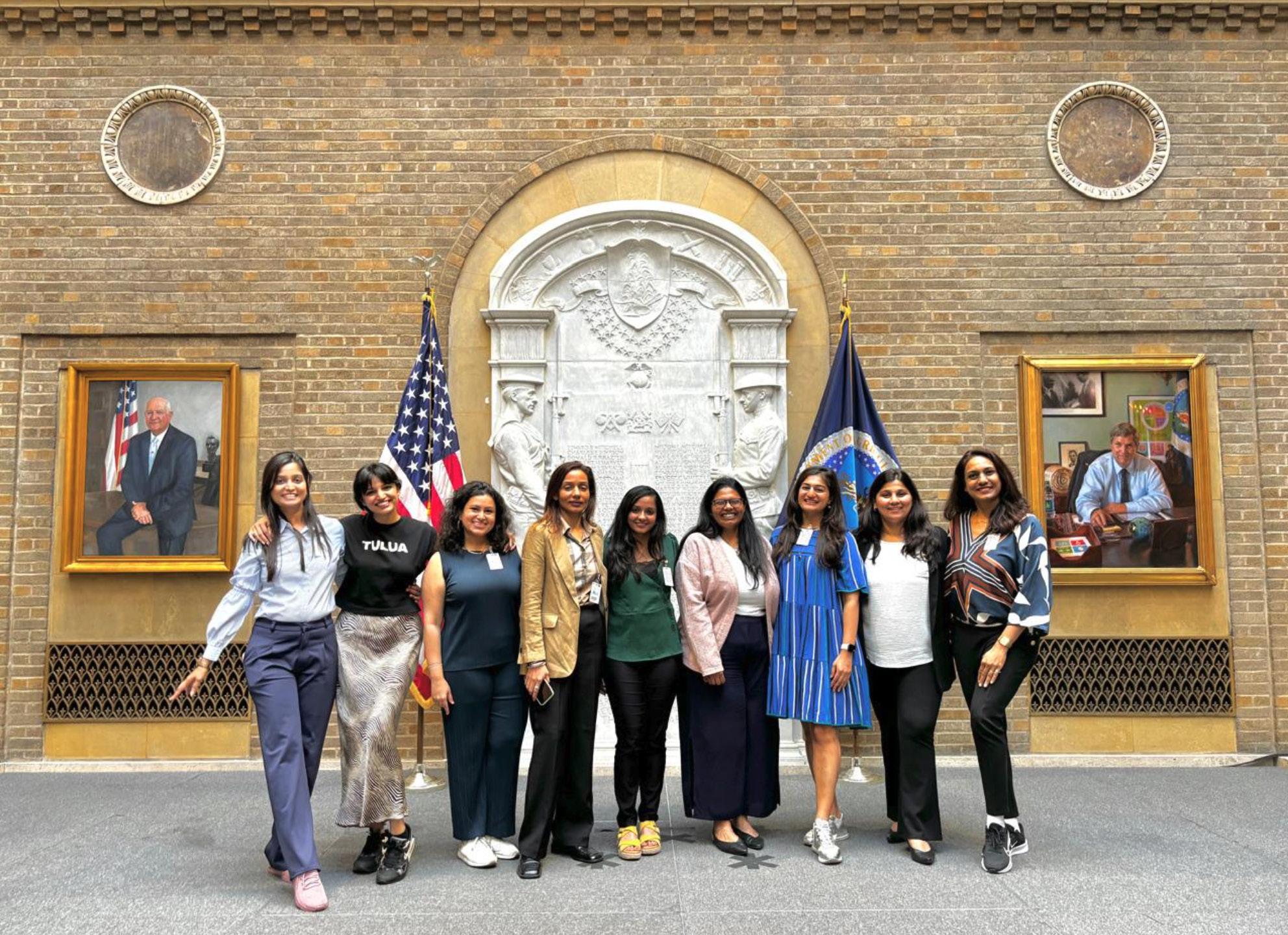
Richy Dave
Tulua Foods, a Mumbai-based company, offers a range of spices and ready-to-cook pastes. Inspired by regional Indian recipes, founder Richy Dave and her team source the spices directly from farms across India, ensuring they deliver the freshest and most aromatic ingredients.
“Whether you’re a home cook looking to explore new flavors or a professional chef aiming to create authentic Indian dishes, Tulua provides the ingredients and inspiration to elevate your culinary experience,” says Dave. “Our tagline, ‘True Indian Flavor,’ reflects our dedication to preserving the essence of Indian cooking and sharing it with the world.”
The Cochran Fellowship Program left a lasting impression on Dave’s growth strategy for Tulua Foods. “The Cochran Fellowship opened several doors for Tulua. I had the opportunity to connect with key organizations like the USDA and the U.S. Food and Drug Administration (FDA), which has been essential for our export ambitions.”
One of the key learnings from the program was how to position products effectively, create impactful marketing plans and execute successful product launches.
Another important takeaway was learning about advanced farming techniques. “The program provided valuable knowledge on innovative farming practices and sustainability measures that we have applied to our sourcing and product quality,” says Dave. “This has enhanced our ability to deliver high-quality spices and pastes while supporting sustainable agriculture.”
Connections made through the program with distributors and business development agencies have played a crucial role in expanding Tulua Foods’ reach and opening up new market opportunities. “These relationships have provided valuable support for our efforts to export to the United States and grow our global presence,” Dave adds.
Dave says starting an agribrand is more than just a business; it carries a significant responsibility. “My key advice for anyone interested in building an agribusiness is to prioritize transparency and honesty with your customers,” she says.
“Ultimately, you offer products that directly impact their health and well-being. Building trust through clear communication and maintaining high standards of quality is crucial for long-term success and customer loyalty.”
Aditi Sharma Trivedi
The first woman farmer entrepreneur in her family, Aditi Sharma Trivedi says her passion comes from working with fellow women farmers, learning and unlearning new skills, and being financially independent. Her Mumbai-based company, Temple Town Farms, produces organic and wellness packaged foods like ghee, honey, mustard oil, lentils and spices.
Agriculture, Trivedi notes, is a significant part of the economy in both the United States and India, contributing to employment, rural development and economic stability. “The Cochran Fellowship Program gave me valuable knowledge of complex food processes and innovative farming techniques,” she says. “I visited several farms and cold storage plants and connected with other entrepreneurs too. The program helped me modify my strategies and sales approach.”
Trivedi has worked with local women farmers for over six years, providing training in organic farming, financial incentives and health awareness. This
has helped some of the women farmers launch their own brands. The knowledge Trivedi gained from the Cochran Fellowship Program has benefitted more local women farmers. “Thanks to my Cochran Fellowship Program knowledge, one of my fellow farmers started a manure processing plant,” says Trivedi. “The program has given me confidence as a farmer and added credibility to my brand.”
Trivedi advises aspiring agribusiness entrepreneurs to approach their ventures with an open mind, free of preconceived notions or biases. She believes this mindset will not only allow them to succeed in any sector but also contribute to the growth of the community.
“One piece of advice I wish I could have given myself at the beginning of my entrepreneurial journey,” she says, “is that if you want to be successful in life or business, there is no ‘I’; it is always ‘we’. ”
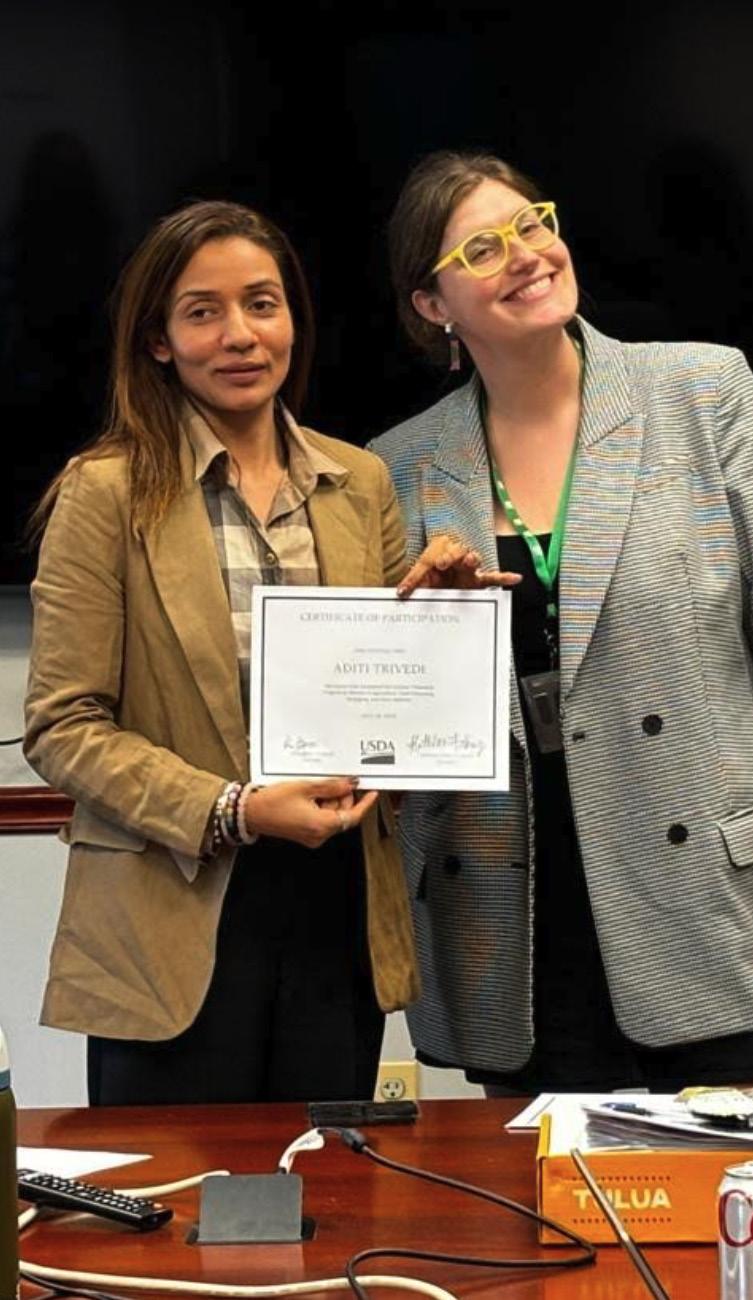

The program has given me confidence as a farmer and added credibility to my brand.
IVLP alumna Malini Nagulapalli is empowering women in STEM careers and entrepreneurship through a U.S. State Department-supported initiative.
BY PAROMITA PAIN
India has the highest number of female STEM (science, technology, engineering and maths) graduates globally. However, the participation of women in the STEM workforce remains low. Studies show that women who pursue STEM degrees are less likely to pursue careers in these fields and tend to leave these careers earlier than their male counterparts.
Malini Nagulapalli, who participated in an International Visitor Leadership Program (IVLP) on “Promoting Biomedical Innovation and Entrepreneurship” in 2022, is now working to enhance the retention of women in STEM careers and promote entrepreneurship among young women. The IVLP is the U.S. Department of State’s premier professional exchange program. By participating in short-term visits to the United States, current and emerging leaders from various fields experience the United States firsthand and build enduring
relationships with their American counterparts.
A scientist and public policy researcher, Nagulapalli’s work spans from academia to public policy, where she addresses challenges in the medical device ecosystem. In 2023, she received an IVLP Impact Award to raise awareness among women about opportunities in science, technology and entrepreneurship.
The IVLP Impact Awards initiative offers follow-on support to recent IVLP participants to help them leverage and share the knowledge and connections gained during the exchange program. This support enables them to design and implement innovative solutions to the challenges facing their home communities.
The IVLP experience
During the IVLP in 2022, Nagulapalli explored entrepreneurship and technology commercialization
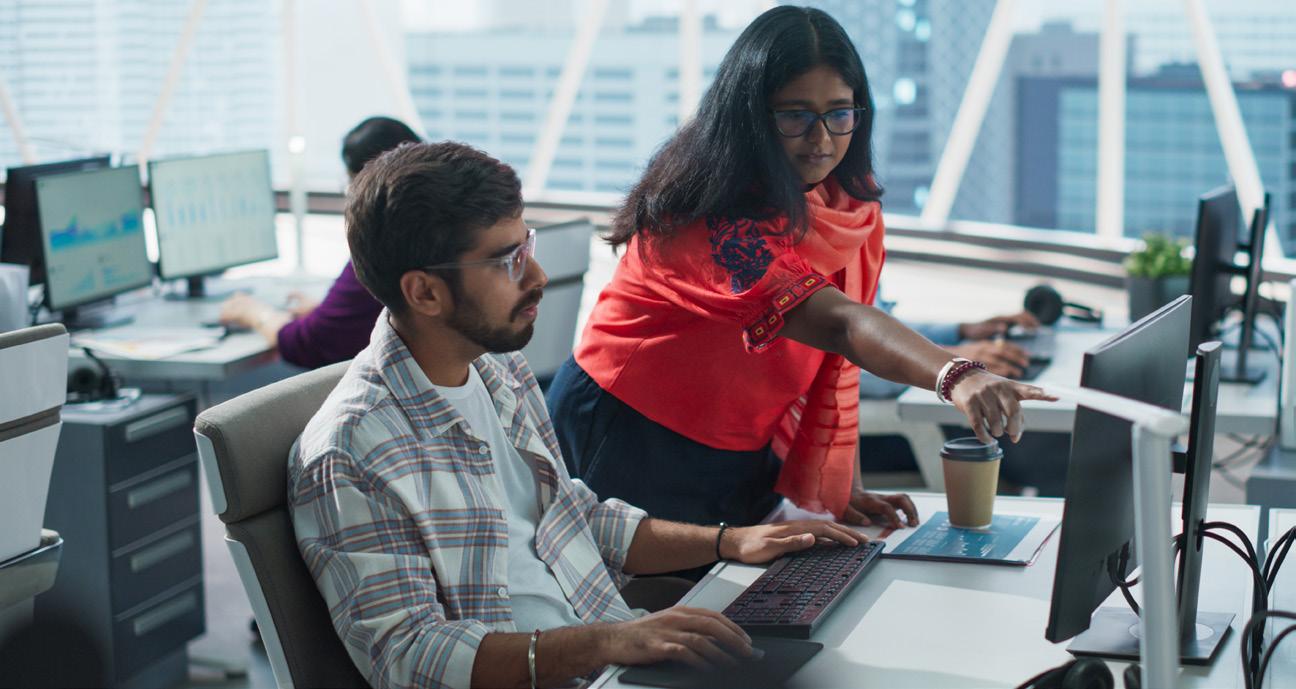
models within the U.S. health care industry. The cohort also analyzed organizational, legal and regulatory frameworks, along with management and marketing strategies, to evaluate and develop innovations in health care systems. Over three weeks, the group traveled to Washington, D.C., Philadelphia, Akron, Kalamazoo and San Diego, and met with key players in the public, private and nonprofit sectors. The participants interacted with individuals from organizations like the U.S. National Institutes of Health, the Patent and Trademark Office, Cleveland Clinic, the Biotechnology Innovation Organization, various incubators, universities, companies like Stryker, and start-ups.
Nagulapalli engaged in peerto-peer interactions, which provided a platform to share knowledge and exchange experiences. “Additionally, the program offered opportunities to immerse ourselves in the local culture through museum visits, dinners hosted by locals, live shows, and more,” she says. “It was an enriching and immersive journey.”
collaborated with me to mentor students pursuing master’s and Ph.D. degrees in areas like health technology assessment, intellectual property rights, science communication, policy, research management, project management and entrepreneurship,” says Nagulapalli. “Our efforts reached approximately 1,400 individuals, including 600 women students in person and around 800 individuals through social media.” Additionally, three institutions and 10 students expressed interest in continued collaboration and mentorship, highlighting the significant impact on the community.

Titled AWESOMES (Advancing Women in Entrepreneurship and STEM Through Opportunities and Mentor Showcasing), Nagulapalli’s IVLP Impact Award project informed participants about STEM career prospects and pathways to employment and entrepreneurship. The goal was to empower women to navigate their professional journeys despite other commitments. AWESOMES is a word Nagulapalli often uses with her daughters when they come up with a solution for a problem. “I was playing around with easy and catchy acronyms that would also define women’s potential in our society,” she says. “It felt right and was a great fit.”
The project has a structured 3-4-5-6-7 plan. It is organized into three modules, featuring four workshops held across five colleges over six months, and supported by seven mentors. “Seven colleagues and friends, all women experts in their respective fields,
The project’s six-month milestone was celebrated at the American Center New Delhi in January 2024. The workshops saw enthusiastic participation, with attendees asking about transitioning to careers in science, technology and entrepreneurship. They enquired about institutions or grants that support capacity-building or preparations for these careers; the availability of courses; and how mentors navigated or overcame resistance in their fields.
Nagulapalli, who has a Ph.D. in structural biology, says she has always been passionate about pursuing a profession that involves saving or enhancing lives.
“While health care seemed like a natural choice at first, I soon realized that I might struggle to balance my academic pursuits with my other interests,” she says. “I also found myself drawn to computational programming for various applications.”
This led her to pursue a bachelor’s and master’s degree in biotechnology and bioinformatics respectively. She is currently studying the challenges associated with scaling medical devices in India. The findings will assist various stakeholders in aligning processes and appropriate resources to address challenges and gaps in the medical device innovation ecosystem.
Clensta, a Nexus-trained start-up, is transforming personal care and promoting sustainability through its innovative waterless hygiene products.
BY NATASA MILAS
In a world where water scarcity is an ever-growing concern, Clensta, a Haryana-based start-up, is paving the way for conservation with its waterless hygiene products. Founded by Puneet Gupta, Clensta offers a waterless shampoo and a body bath, which promise to save up to 350 liters of water per 100 ml bottle. They work through a simple process of spraying, massaging and wiping.
Clensta was part of the second cohort at the Nexus Startup Hub, a partnership between the U.S. Embassy New Delhi and the Alliance for Commercialization and Innovation Research. Nexus connects start-ups, innovators and investors, offering access to networks, training, mentors and funding.
The commitment to sustainable hygiene has earned Clensta recognition and support, including a grant from USAID/India, through its SAMRIDH Healthcare Blended Finance Facility. This financial assistance is helping Clensta access capital to expand its sales force and establish direct distribution channels with wellknown networks and partners.
The start-up also hopes to have a significant impact in the health care sector. By improving personal hygiene, Clensta’s waterless products can prevent hospitalacquired infections among patients. This can reduce average hospital stays and help alleviate the burden on health care infrastructure.
Excerpts from an interview with Gupta.
Clensta’s waterless products significantly reduce water consumption. They also exclude harmful ingredients known for their long-term side-effects. We prioritize the use of recycled plastic packaging to further reduce our ecological footprint.

What inspired you to create a company that produces waterless hygiene products?
Water scarcity is a critical issue affecting many regions worldwide, including remote areas, hospitals and crisis situations. My experiences of working alongside health care professionals in rural India helped me understand the challenges of maintaining traditional hygiene practices due to water scarcity. This inspired me to create innovative and sustainable personal care products that would enable people to maintain hygiene without relying on water.
Can you name some of your most successful products? How do they work without water?
Some of our most popular products include the Waterless Body Bath and Waterless Shampoo. Both offer effective cleaning and sanitization without requiring water. The gentle foam of the body bath easily removes dirt and bacteria when applied directly to
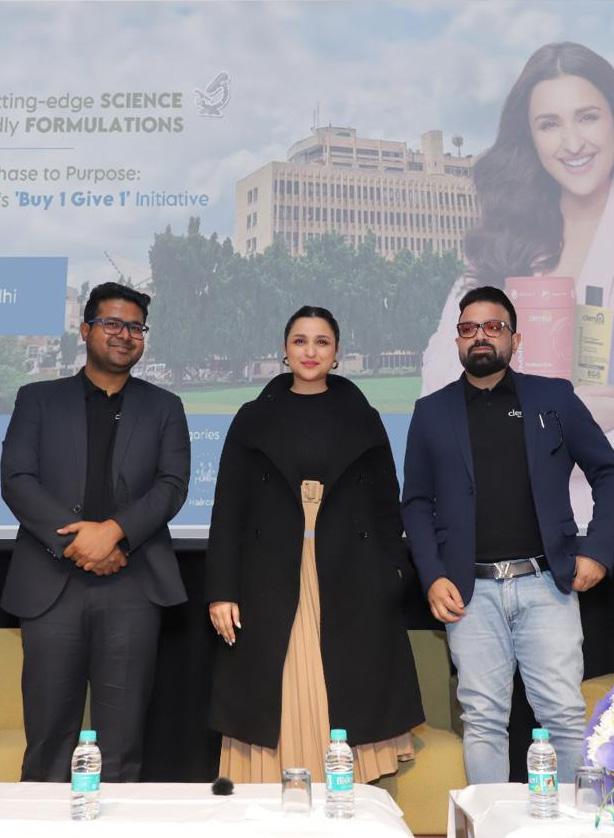
the skin. Our Waterless Shampoo works similarly, absorbing oil, and leaving the hair feeling clean and fresh. Both products are formulated with skin-friendly ingredients and are easy to use, making them ideal for various situations, from hospitals to outdoor adventures.
Beyond our waterless category, our Red Aloe Vera and Rosemary product lines have also gained significant traction. These products leverage the natural benefits of their ingredients to offer consumers enhanced skincare and wellness solutions.
Can you tell us about your training at the Nexus Startup Hub?
The training has been instrumental in shaping our company’s journey. It provided a comprehensive approach to business development, covering everything from market research and customer validation to financial modeling and fundraising strategies. These insights have been invaluable in refining our business plan and positioning our product in the market.
The program connected me with a diverse network of industry experts, fellow entrepreneurs and potential investors, which has been essential in securing partnerships, collaborations and guidance.
The hands-on workshops were particularly beneficial, as they allowed us to apply theoretical knowledge to practical business challenges and develop tailored solutions.
One of the standout features of the Nexus training was the access to seasoned mentors who provided personalized feedback and advice. Their mentorship was instrumental in overcoming hurdles and accelerating our progress.
Tell us about the environment-friendly aspect of your products.
Our waterless products significantly reduce water consumption. We use biodegradable and ecofriendly ingredients in our formulations to minimize the impact on the environment.
Clensta products also exclude harmful ingredients known for their long-term side-effects. We prioritize the use of recycled plastic packaging to further reduce our ecological footprint. By integrating green practices throughout our product lifecycle, we strive to create solutions that benefit both people and the planet.
What were some of the biggest challenges you have faced?
There were several challenges, including developing a product that maintained the effectiveness of traditional hygiene products while being waterless. Extensive research and development were essential to create products that were both effective and safe for users.
Marketing the products has been particularly challenging, as it can be very expensive. We rely heavily on repeat purchases from satisfied customers. Additionally, leveraging the influence of our celebrity investor, Parineeti Chopra, has helped us reach a wider audience and build brand recognition.
Establishing a reliable supply chain and distribution network was crucial to ensure that our products reached those in need. This involved forging partnerships and establishing a strong presence in both urban and rural markets.
What are Clensta’s upcoming plans?
We aim to continue expanding our product range and reach and introduce more advanced and ecofriendly products. A data-led approach will guide our product development, ensuring we meet evolving consumer needs and preferences.
International expansion is also on the horizon, as we aim to bring our waterless technology to markets facing water scarcity challenges. Through collaborations with health care organizations and nongovernmental organizations, we hope to reach underserved


communities.
We are also exploring digital platforms to educate and engage consumers. Our vision is to lead the sustainable personal care industry, driving positive change in health and hygiene practices worldwide.
From India’s first solar ferry to solar fishing boats, IVLP alumnus Sandith Thandasherry’s innovations are transforming marine transport.
BY RANJITA BISWAS
Sandith Thandasherry is passionate about “saving energy, saving fuel and saving money” in the marine transport sector. With these goals in mind, he founded Navalt, an eco-marine tech company providing a sustainable alternative to traditional diesel-powered vessels. The company has reached several milestones, including the launch of Aditya, India’s first solarpowered ferry, which operates between Vaikkom and Thavanakadavu in Kerala.
In 2018, Thandasherry participated in the International Visitor Leadership Program (IVLP) on “Building Regional Resilience to Environmental Challenges.”
The IVLP is the U.S. Department of State’s flagship professional exchange program. Through short-term visits to the United States, current and emerging leaders from across the world gain firsthand experience of the country and forge lasting connections with American counterparts from their respective fields. The diverse insights gained during the exchange program “were instrumental in shaping our innovative approach to developing solar-powered fishing boats,” says Thandasherry. “I would say the IVLP experience was a catalyst for innovation.”
Excerpts from an interview.
How did you develop the idea of environment-friendly marine transport?
Recognizing the inefficiencies in traditional boat construction,
we focused on improving stability and performance. Initially, we provided design services to shipyards in Kerala. Our early experiments with solar-powered boats, including India’s first solar boat built in our garage in 2009, laid the groundwork for our future endeavors. Retrofitting a small fishing boat in Gujarat deepened our understanding of vessel performance and the potential of solar power in marine transport. These experiences solidified our belief that marine transport offers a significant opportunity for solar electrification.
When did you start putting these ideas to work?
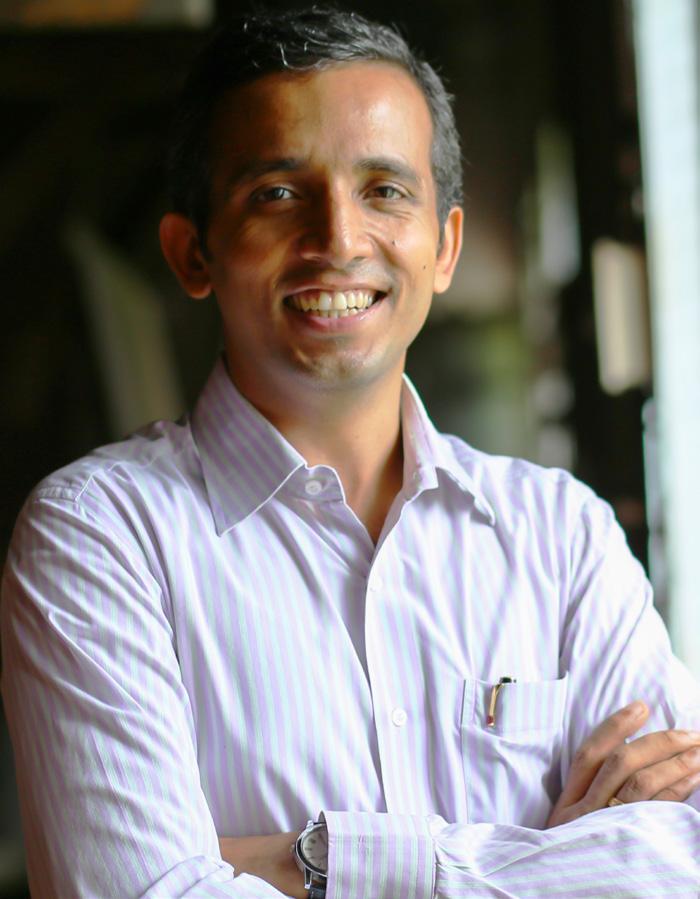
Navalt was founded in 2013, and our flagship project, Aditya, India’s first solar ferry, was launched in 2017 for Kerala’s State Water Transport Department. Navalt has consistently pushed the boundaries of technology and innovation. In 2022, we delivered the world’s first solar fishing boat, SRAV, which means shark in Malayalam. In 2023, we launched India’s fastest solar boat, Barracuda, and in 2024, we completed India’s largest solar-powered boat, Indra. Currently, we are developing the world’s first solar-electric RORO (roll-on/roll-off) vessel capable of transporting 20 cars or four large trailers. Additionally, we are working on technologies to implement

fuel cells, green fuels and wind power.
Why are these innovations important for marine transport?
About 90 percent of the world’s cargo is transported by water, and the shipping industry contributes 3 percent to global pollution. Solar boats offer a solution to minimize this pollution.
There are several reasons to choose solar boats. They eliminate air and water pollution; reduce the risk of oil spills and floating debris; provide a more comfortable commuting experience by eliminating noise, vibration and the smell of fuel; and offer significant savings on fuel and maintenance costs.
For boat owners, solar vessels offer long-term cost-effectiveness compared to traditional boats. They also create jobs in the clean energy sector and boost local economies. The design of the boats focuses on stability to enhance safety and reduce the chances of accidents.
a further reduction of 1,500 tons of carbon emissions annually. This translates to average yearly savings of 35 tons per small boat and 92 tons per larger vessel. In response to tourism demands, we now offer small- to medium-sized cruise boats. Our boats operate in six states.
Can you tell us about your IVLP experience? What were your main takeaways from the program?
Navalt’s fleet comprises 27 operational solar boats, with 62 more in the pipeline. Our existing vessels have already reduced carbon emissions by over 2,000 tons. Once the planned boats are operational, we anticipate a further reduction of 1,500 tons of carbon emissions annually.
What is the impact of your innovations vis-à-vis the protection of waterways and oceans?
Navalt’s fleet comprises 27 operational solar boats, with 62 more in the pipeline. Our existing vessels have already reduced carbon emissions by over 2,000 tons. Once the planned boats are operational, we anticipate
The IVLP was a truly transformative experience. Over the course of the program, we visited five cities across the United States, each presenting a unique and contrasting scenario. These diverse settings exposed me to different perspectives on how local conditions and resources shape solutions to community challenges. For example, in New Hampshire, I was inspired by their motto “Live free or die,” and how its resilience measures reflect this philosophy. The experience also highlighted the importance of integrating sustainable energy solutions into community development, especially for marginalized communities that rely on sea fishing. The IVLP experience has been a catalyst for innovation.
Ranjita Biswas is a Kolkata-based journalist. She also translates fiction and writes short stories.
ProMeat, a Nexus-trained start-up, provides innovative plant-based meat alternatives that cater to health-conscious consumers.
BY NATASA MILAS
The rising interest in sustainable, ethical and health-conscious food has fueled the popularity of plant-based meat. Estimates suggest the plant-based meat market in India is currently worth around $135 million and could grow fourfold by 2030. These alternatives are designed to mimic the taste and texture of traditional meat while being made entirely from plantbased ingredients.
Innovative companies across India have developed plant-based products ranging from eggs and samosas to dumplings and kebabs. One such brand is ProMeat, which participated in Cohort 17 at the Nexus Startup Hub, a collaboration between the U.S. Embassy New Delhi and the Alliance for Commercialization and Innovation Research. Nexus links start-ups, innovators and investors, providing access to networks, training, mentors and funding.
“Through the Nexus program, ProMeat benefitted from in-depth mentorship provided by industry experts, offering strategic insights and tailored guidance to meet our specific needs,” says Ichcha Lizmi, business development and community engagement specialist at the Mumbai-based start-up. Additionally, the program provided access to crucial funding opportunities for scaling operations. The networking events organized by Nexus also helped the start-up connect with potential partners, investors and other start-ups.
“The most impactful aspect of the Nexus training was the personalized mentorship sessions,” says Lizmi. “These sessions enabled us to refine our business strategy, enhance our brand development, and optimize
our market approach. The hands-on training modules focused on strategic planning and business development were particularly beneficial, equipping our team with the skills needed to navigate the competitive landscape of the alternative protein market.”
Lizmi identifies a clearer strategic direction and a stronger brand presence as key takeaways from the Nexus program. “We have developed a more robust business model and gained critical insights into scaling sustainably,” she says. “Overall, the Nexus pre-incubation program has empowered ProMeat to advance our mission of providing high-quality, sustainable meat alternatives that are both affordable and accessible to consumers worldwide.”
Building on the foundation laid during the Nexus program, ProMeat’s innovative approach extends to its use of high-quality, sustainable ingredients.
“ProMeat utilizes a variety of plant-based ingredients,” says Lizmi. “The core ingredients include green peas, mung beans, soy, oats and wheat, and the occasional addition of jackfruit for its unique texture and nutritional benefits.”
This blend of ingredients is rich in protein and fiber. “The inspiration behind creating ‘meatless meat’ at ProMeat stems from a desire to offer consumers a sustainable alternative to traditional meat,” she adds.
Replicating the taste and texture of meat was not easy. “Achieving the right texture was particularly difficult,” Aditya Shetty, a member of the core team at ProMeat, explains, “as consumers expect a certain feel and juiciness that is hard to replicate with plant

ingredients.” The company overcame this by employing a proprietary wet extrusion technology, which allows the creation of textured vegetable protein that closely mimics the flavor of animal meat. “Continuous research and testing in approved labs were critical to refining the product to meet consumer expectations,” Shetty adds.
ProMeat is not aimed solely at vegetarians or vegans, but also at flexitarians, “a growing segment in India that includes individuals who are reducing their meat consumption but still desire the taste and experience of meat,” says Shetty. He adds that ProMeat’s products are popular among Gen Z and millennials, particularly “busy techies” and “food explorers” who are open to trying new and unique food options. “This demographic is characterized by their curiosity and willingness to explore alternatives that align with their health and ethical considerations, making them ideal consumers for ProMeat’s innovative offerings,” says Shetty. Looking ahead, ProMeat has ambitious expansion plans, which include expanding to cities like Pune and Surat in the short term and launching new product variants.
The start-up is also exploring international markets. “ProMeat is focused on scaling its operations and increasing its presence in domestic and international markets,” says Shetty, “positioning itself as a leader in the plant-based food industry.”


